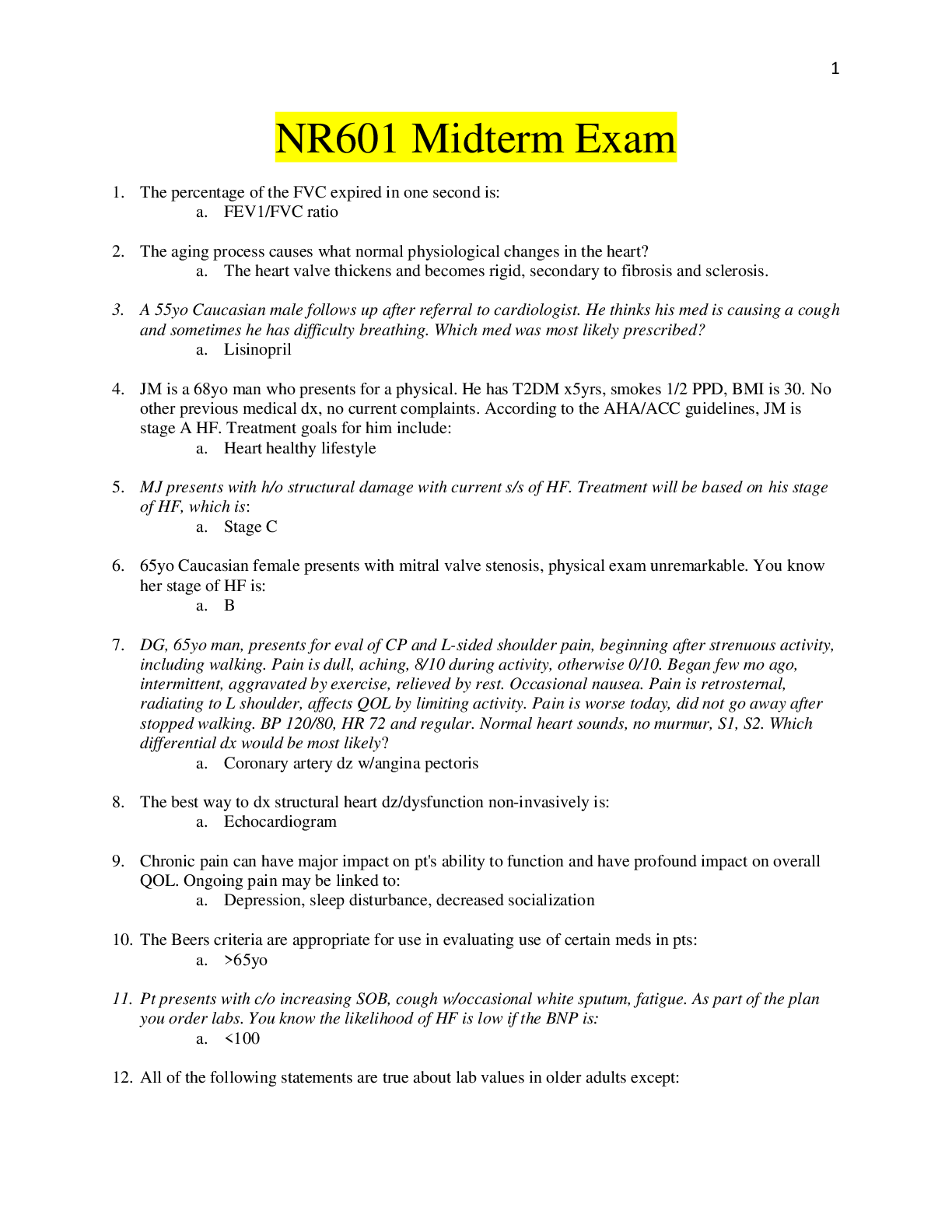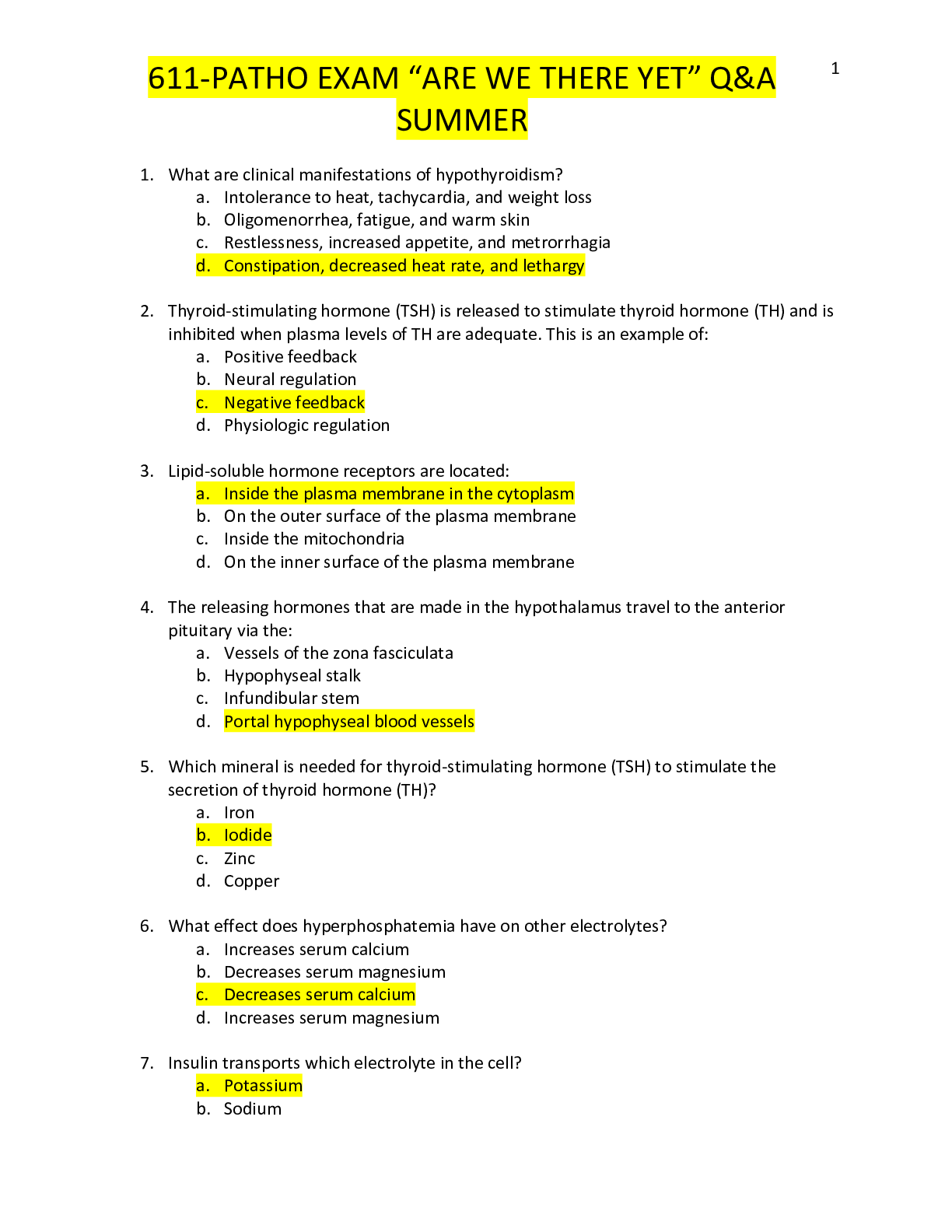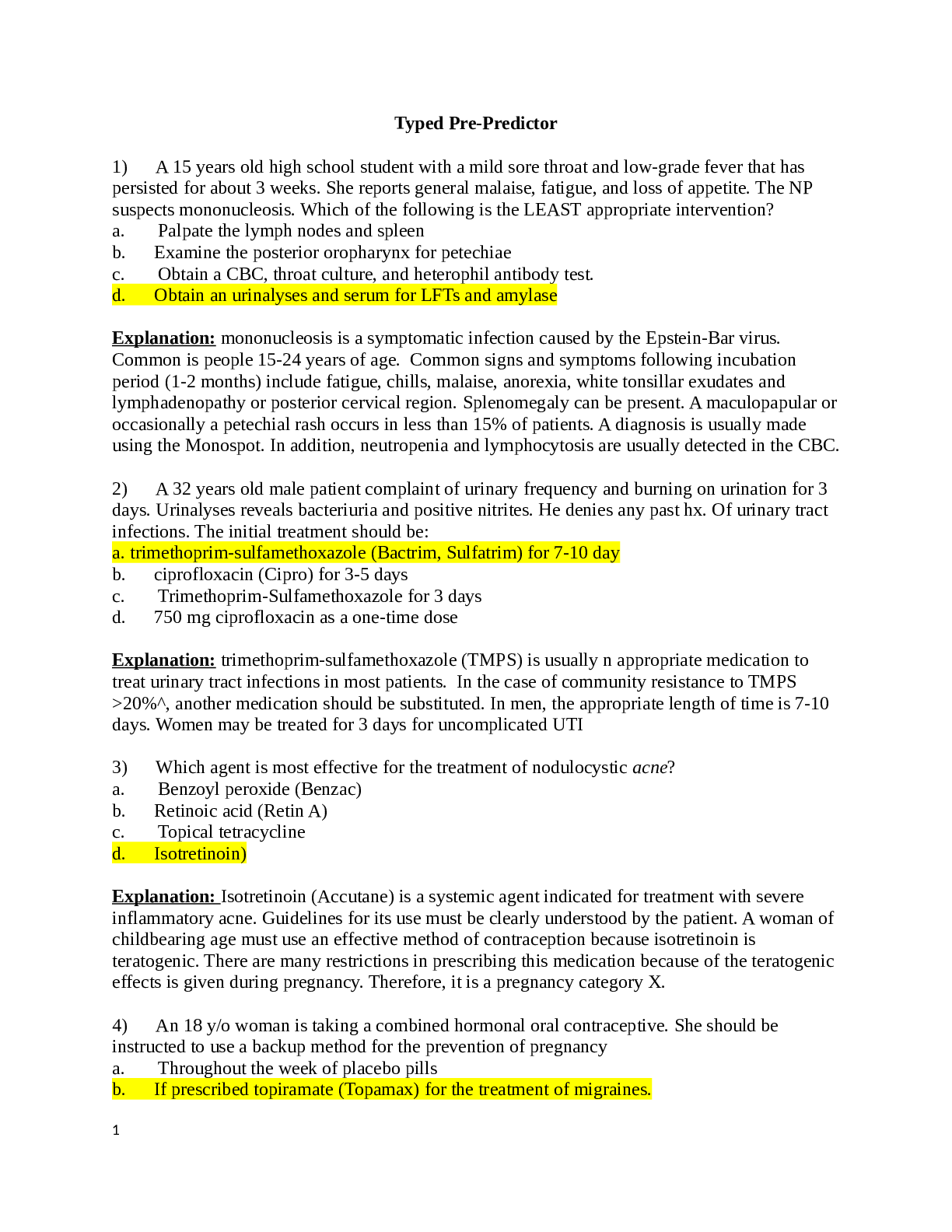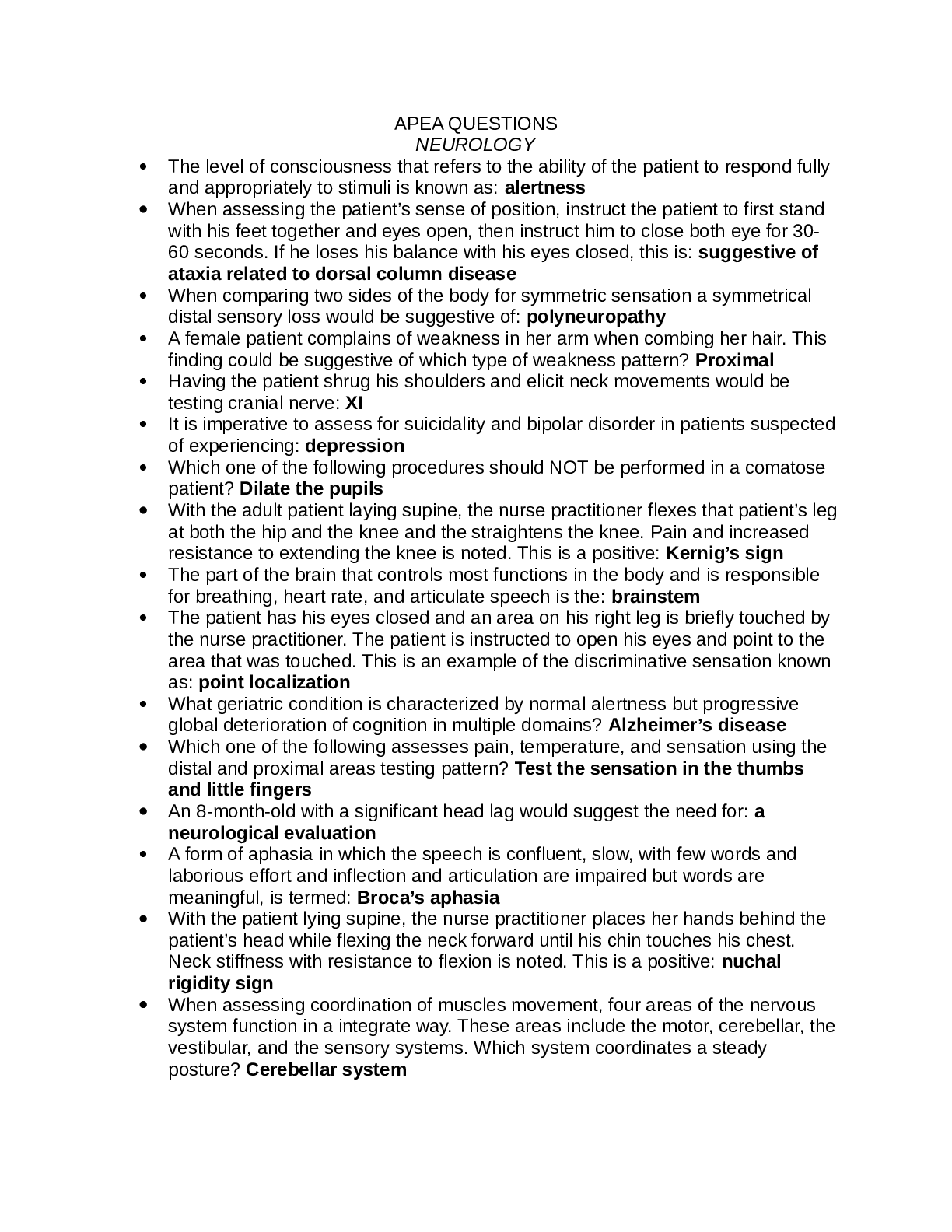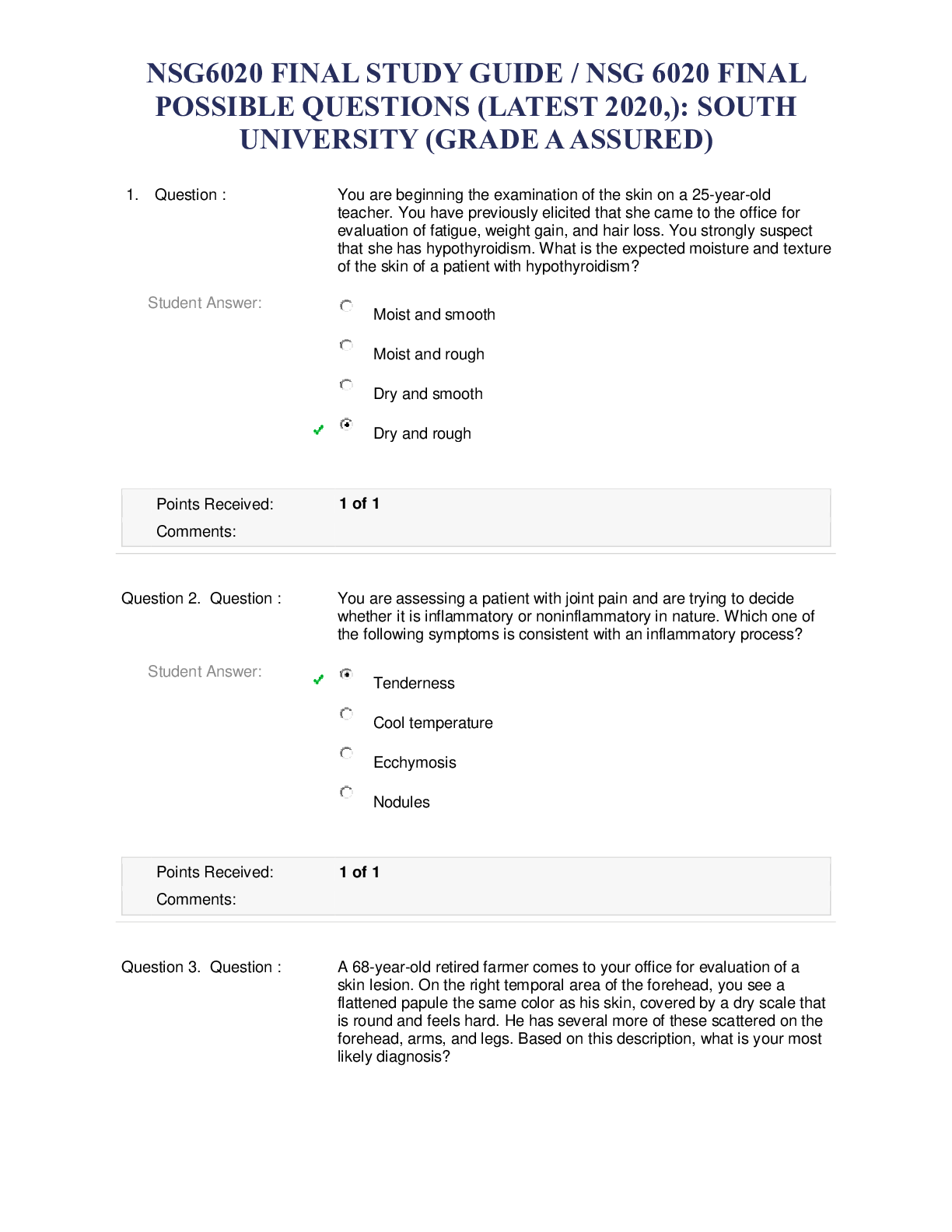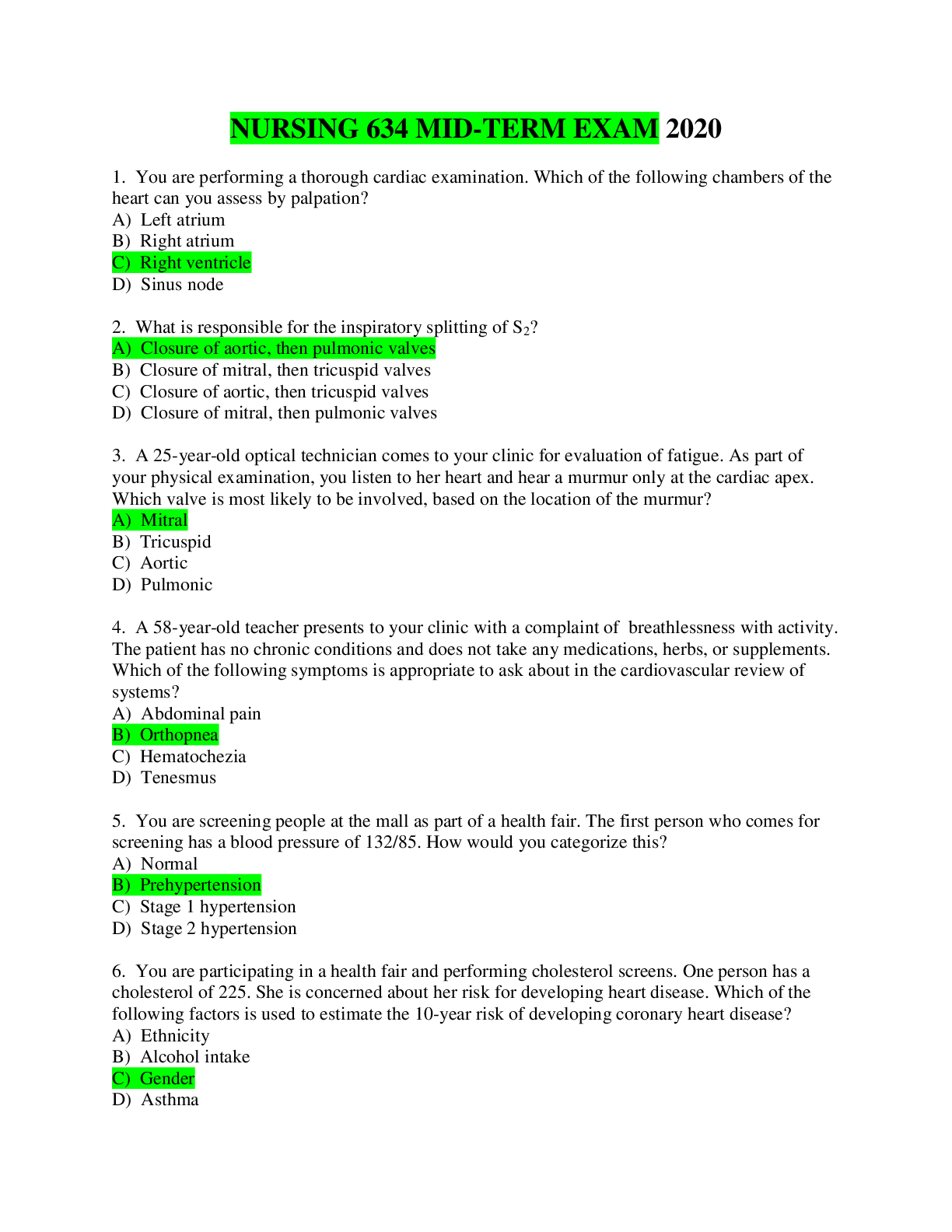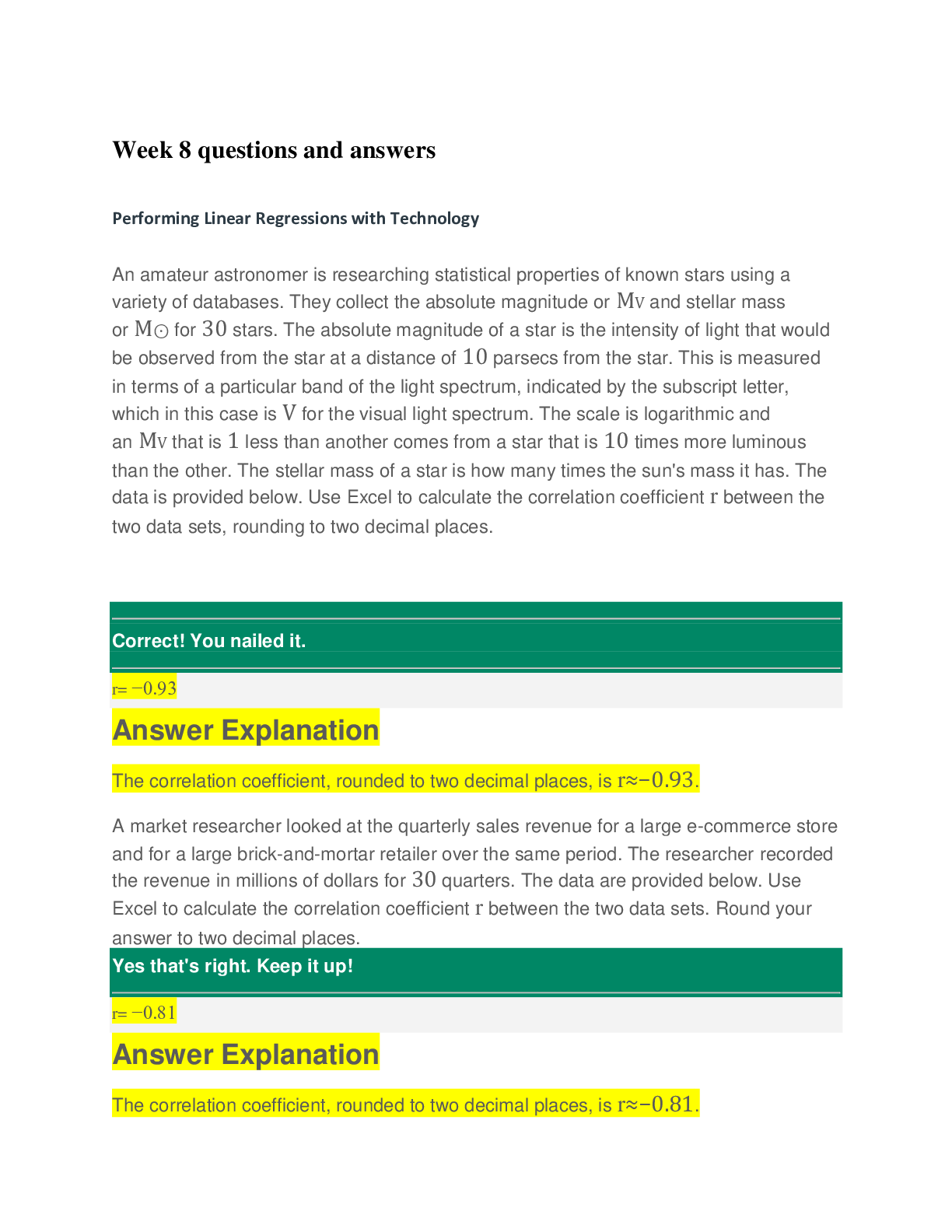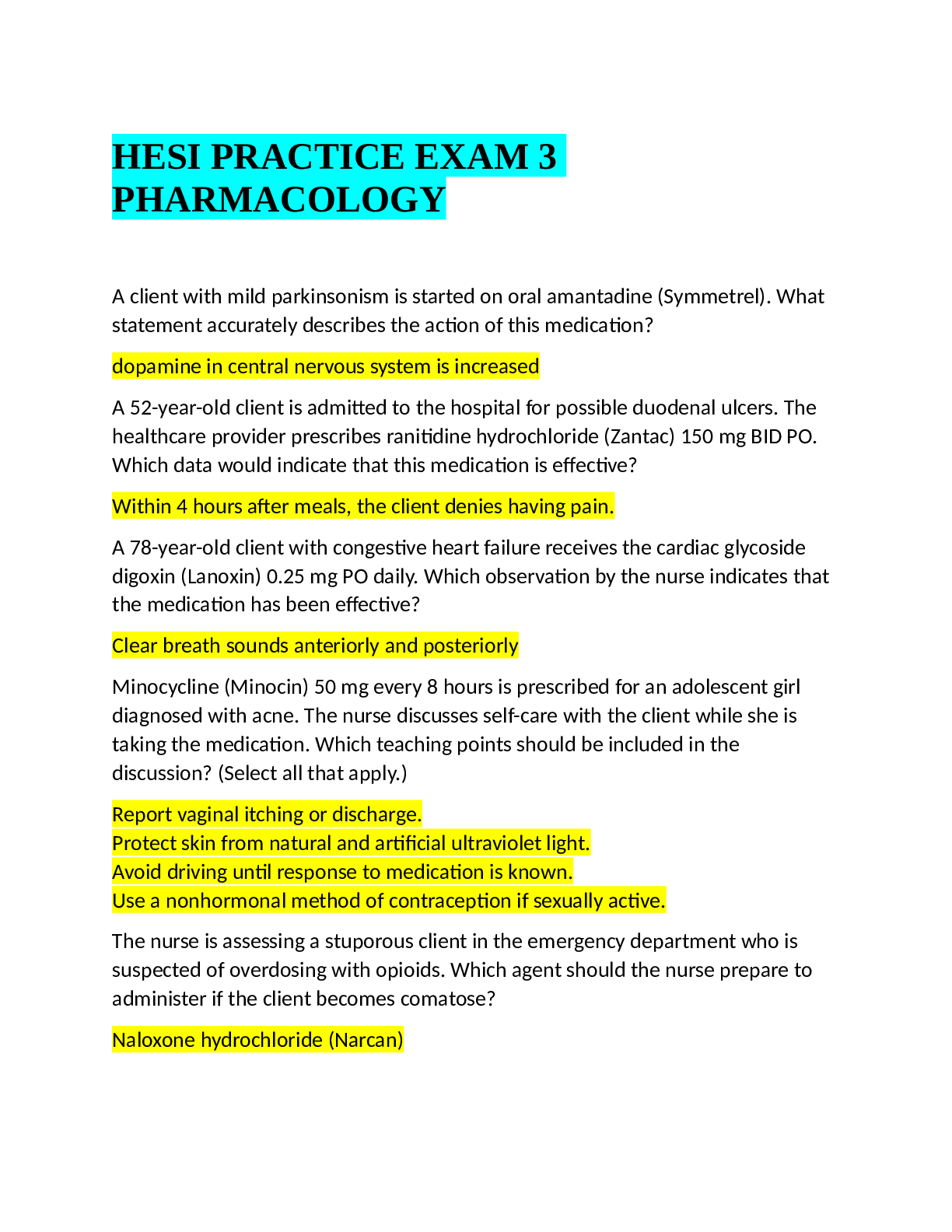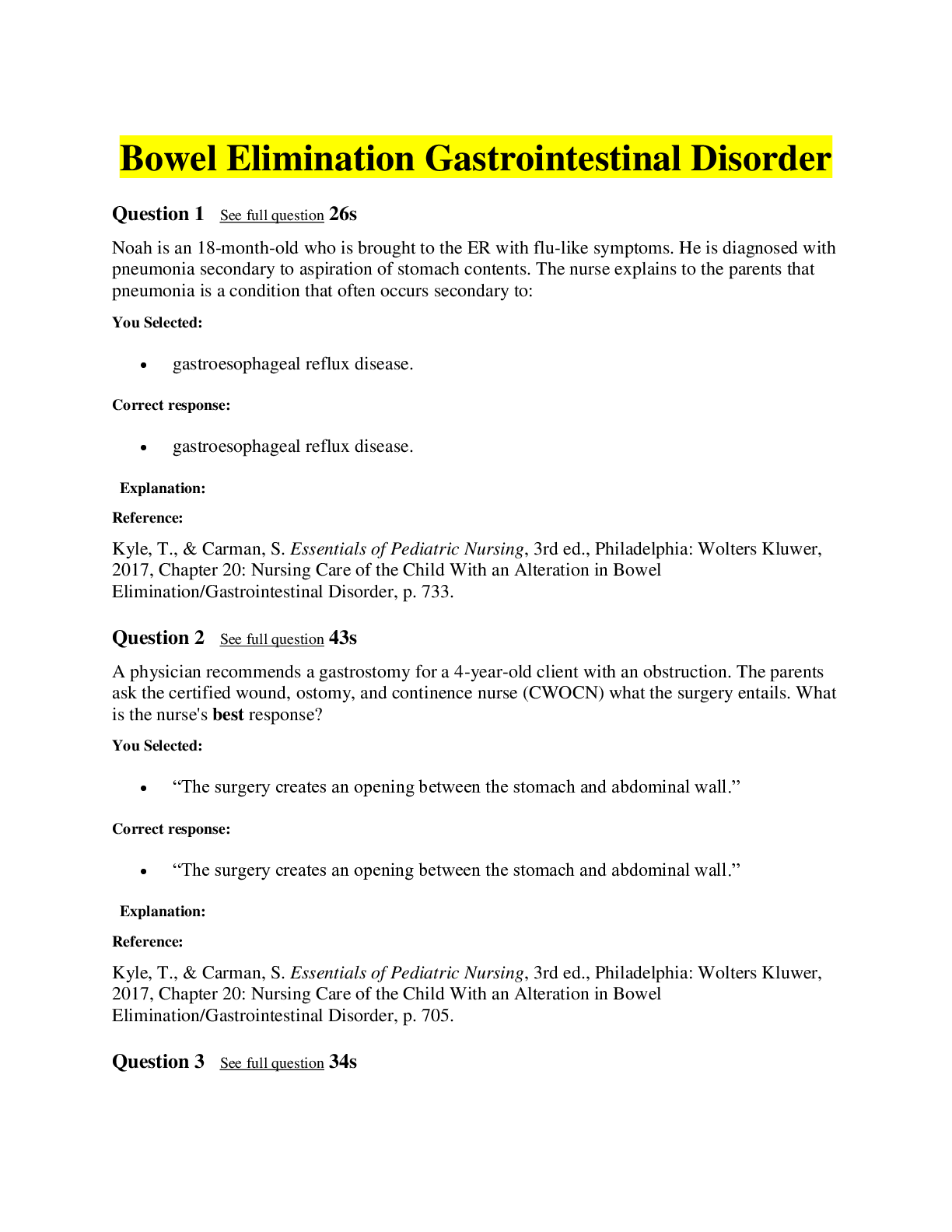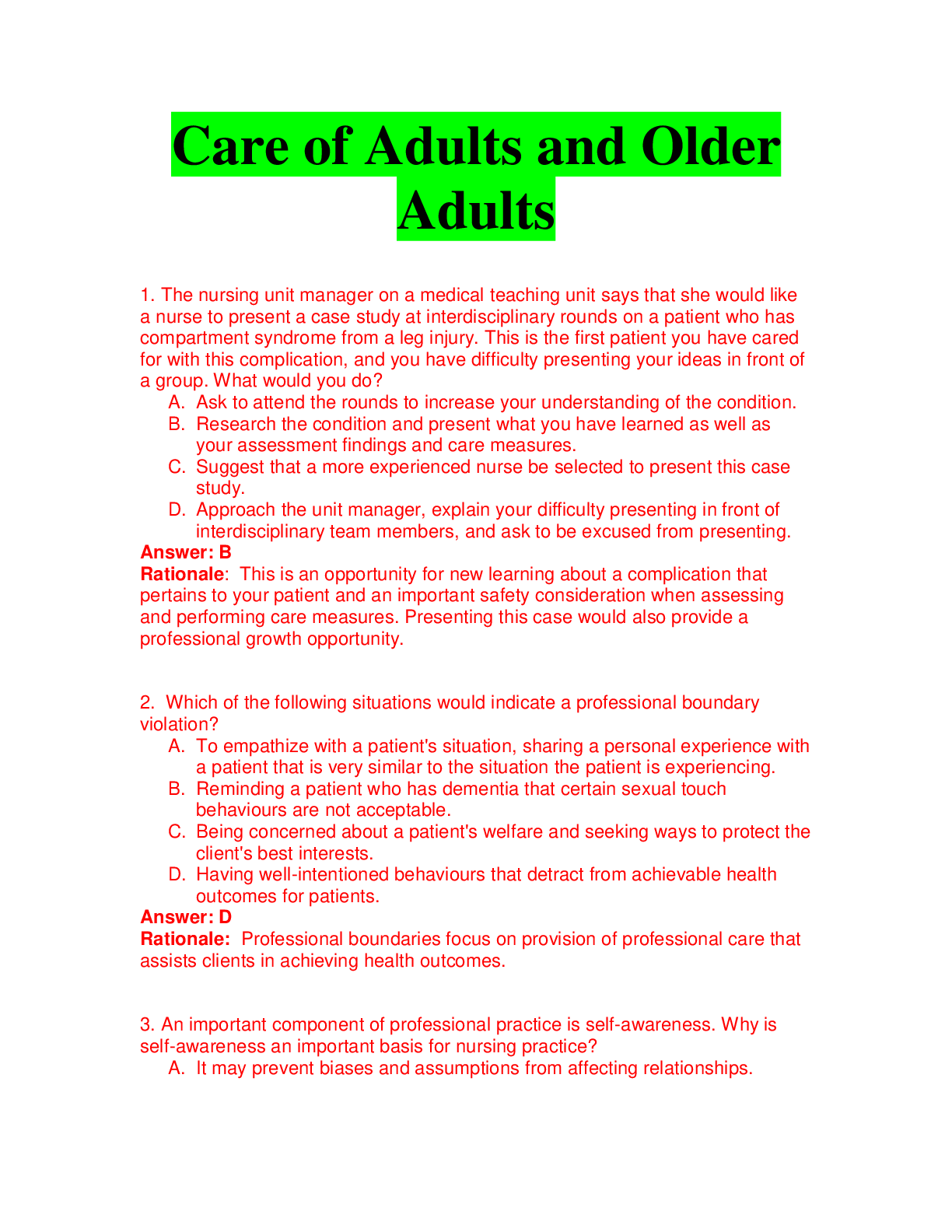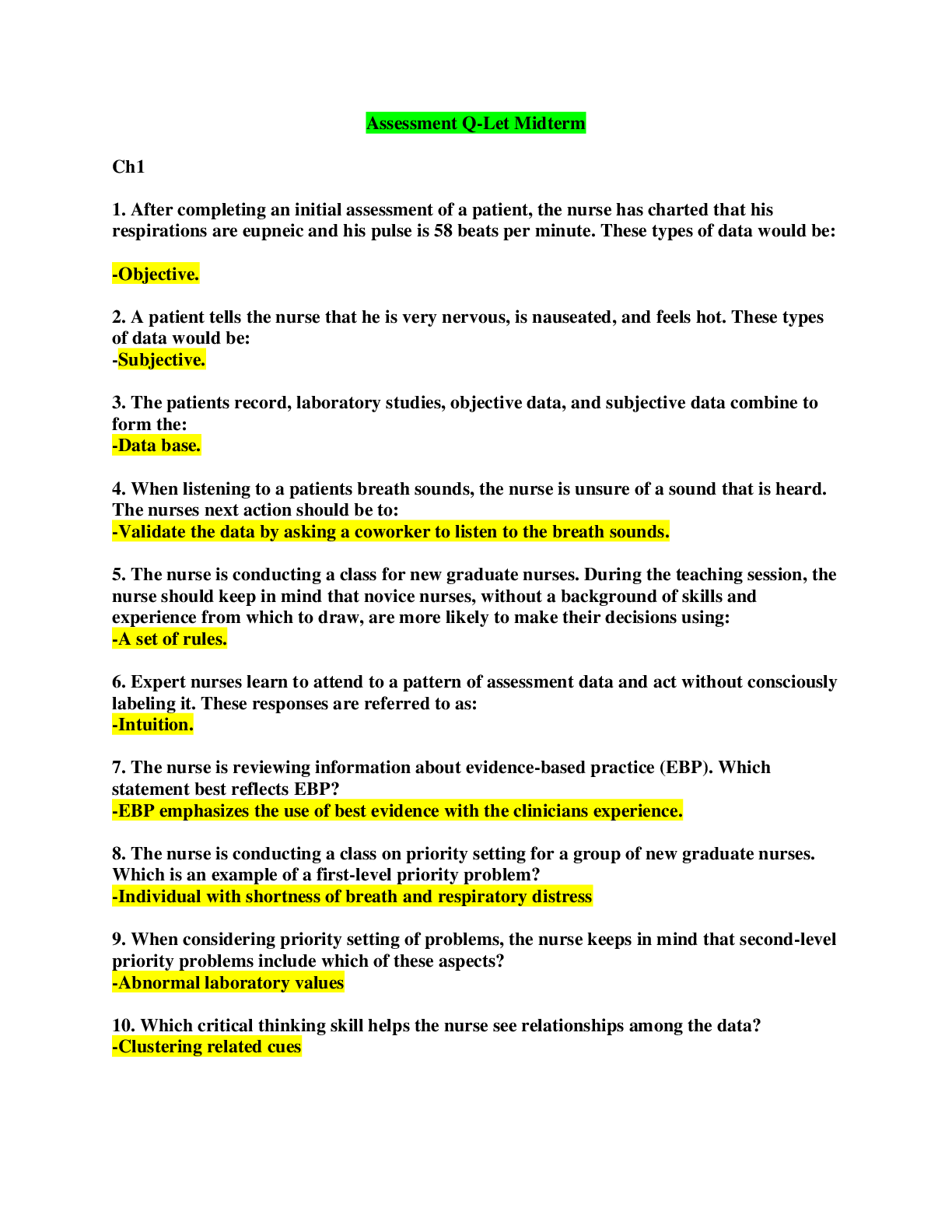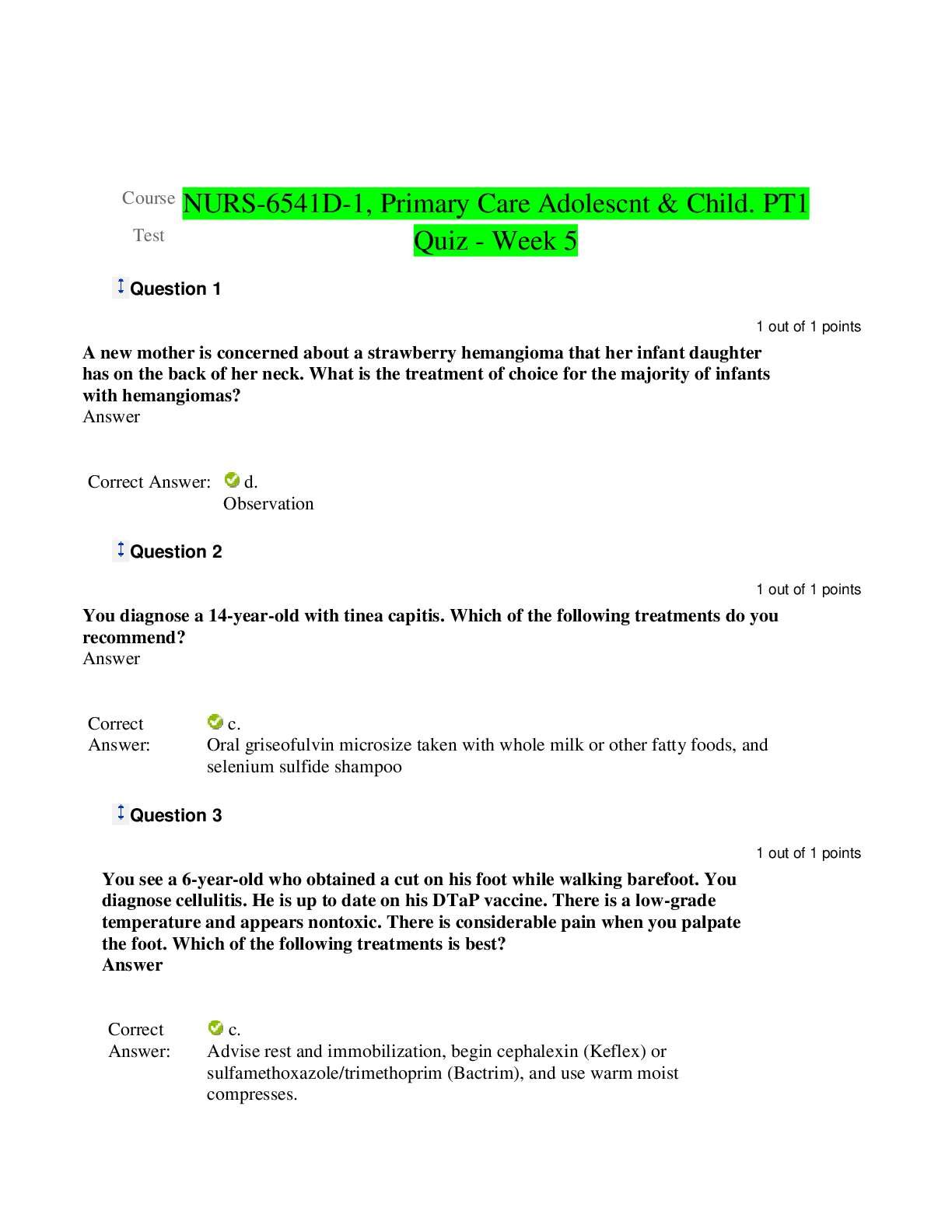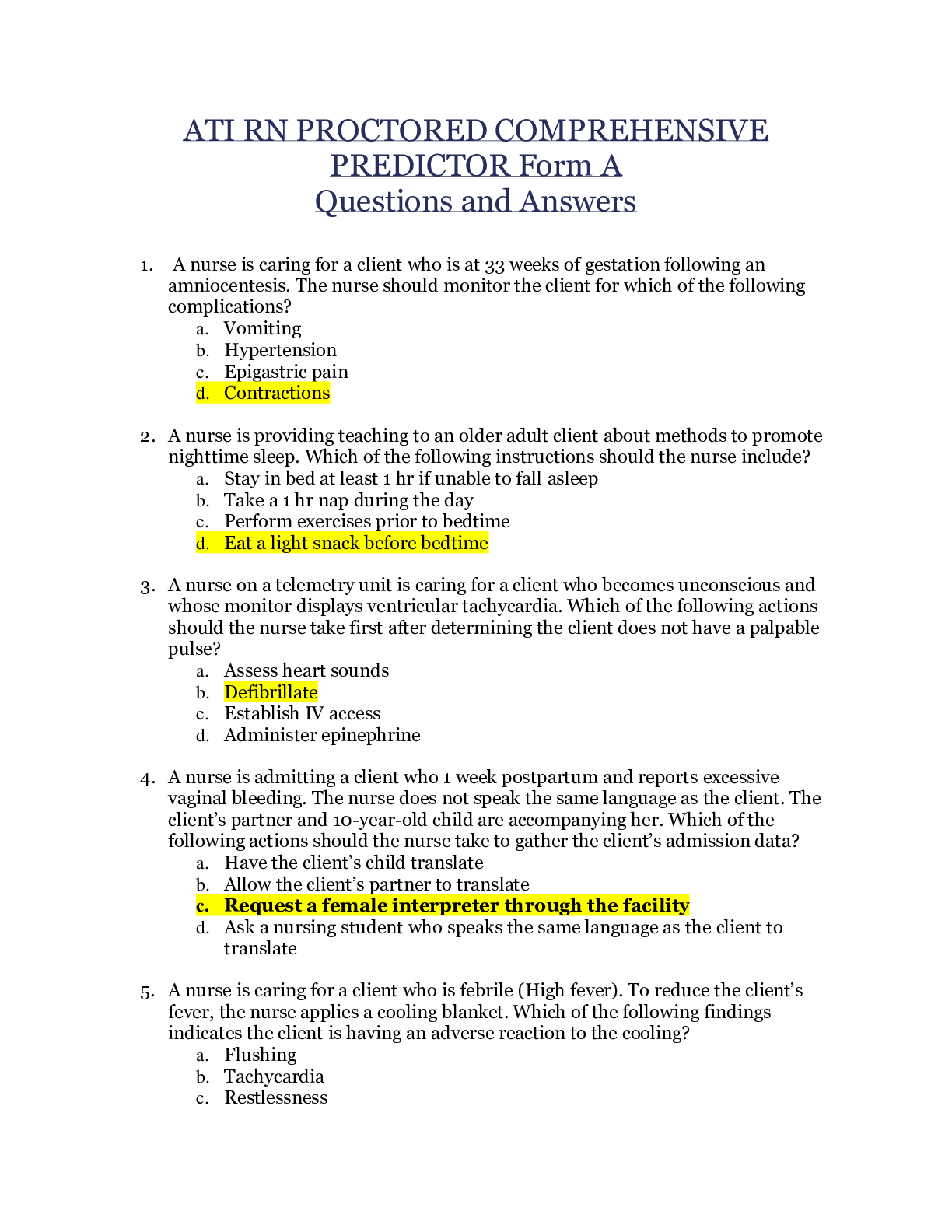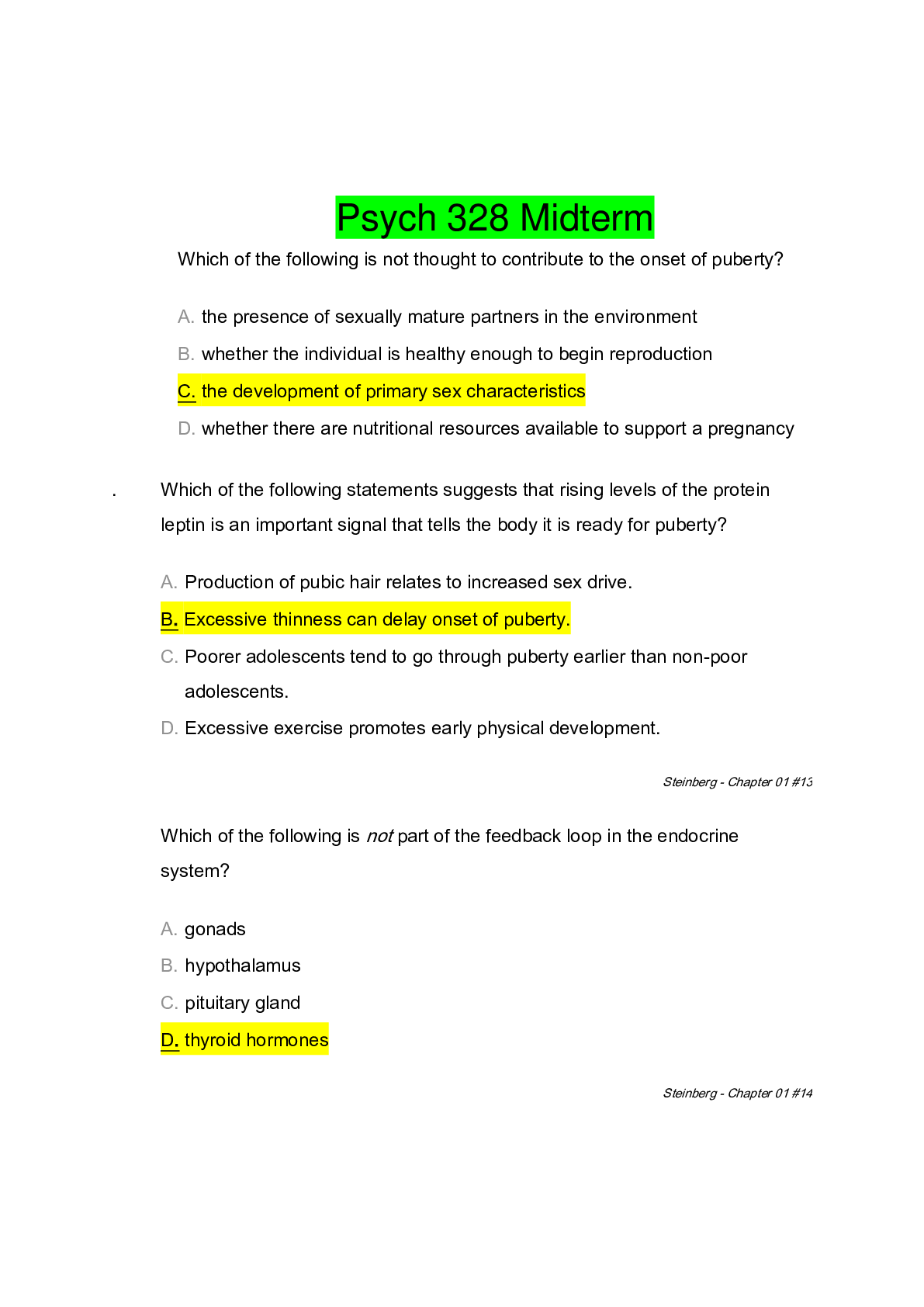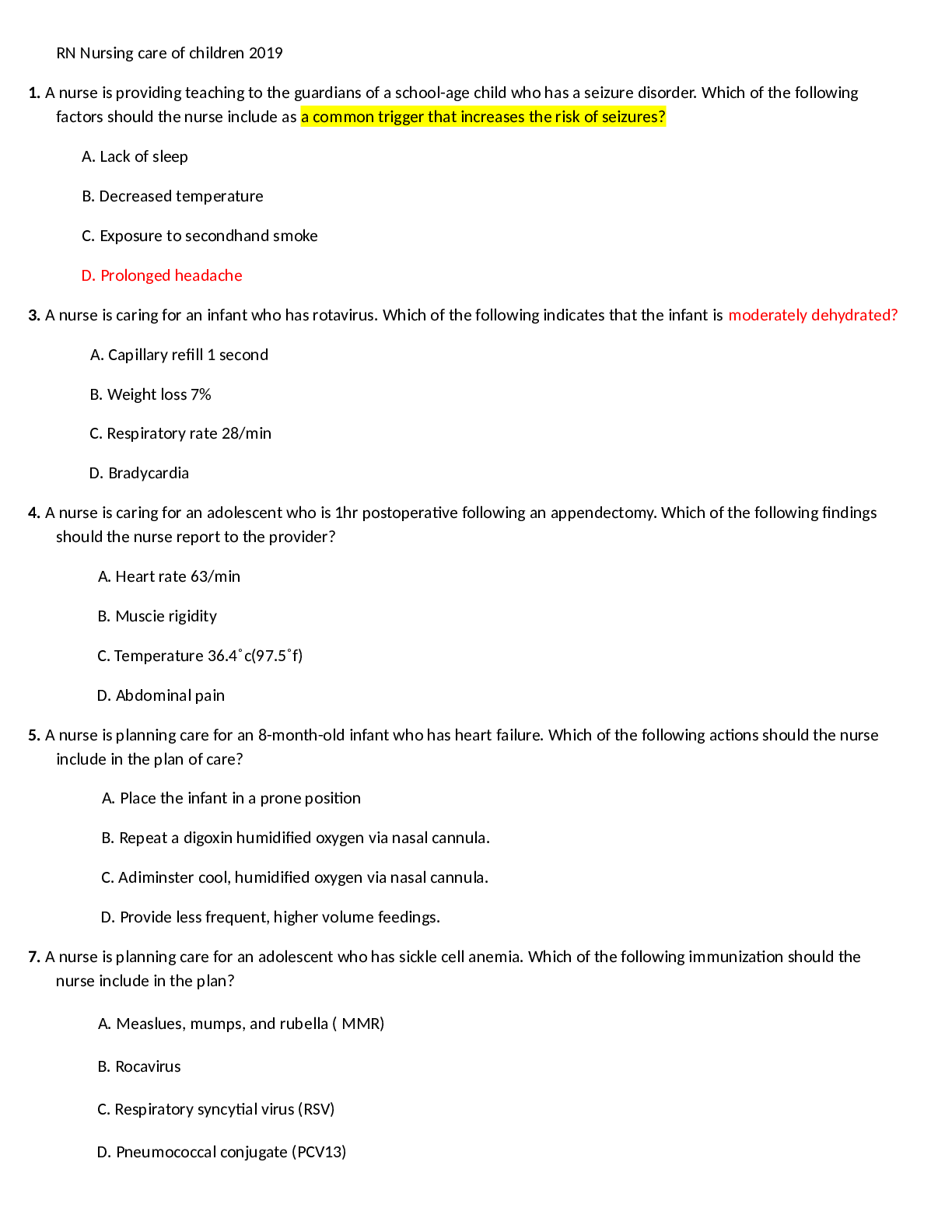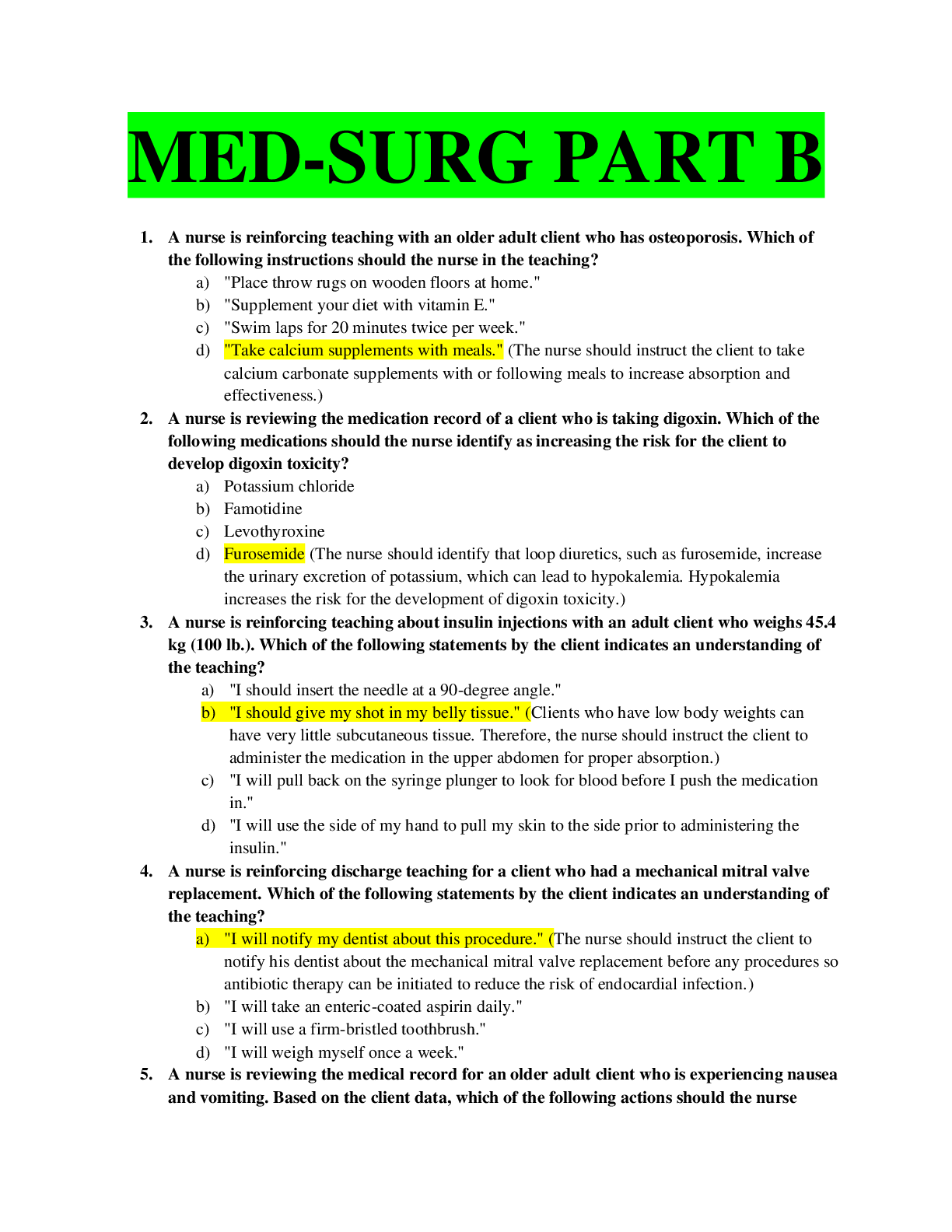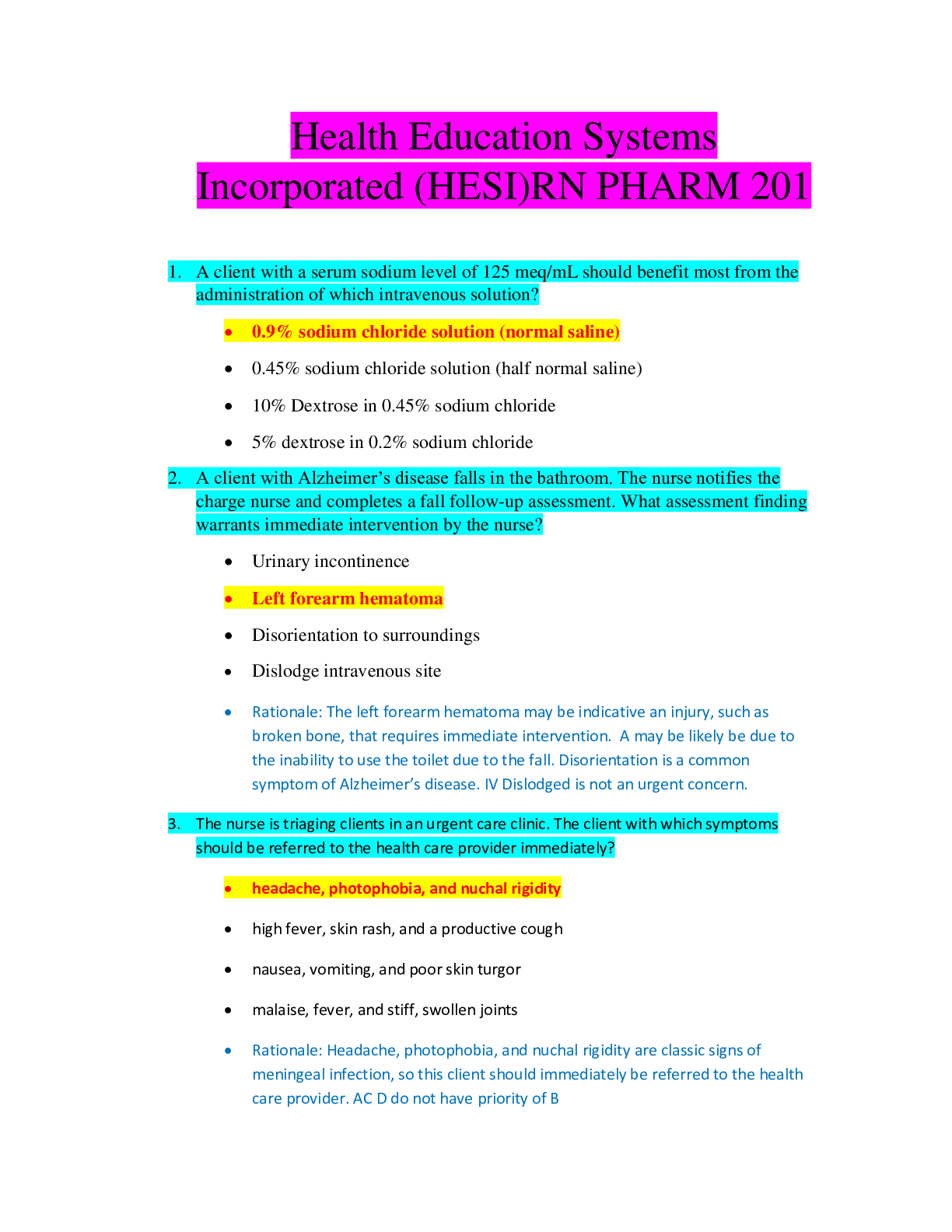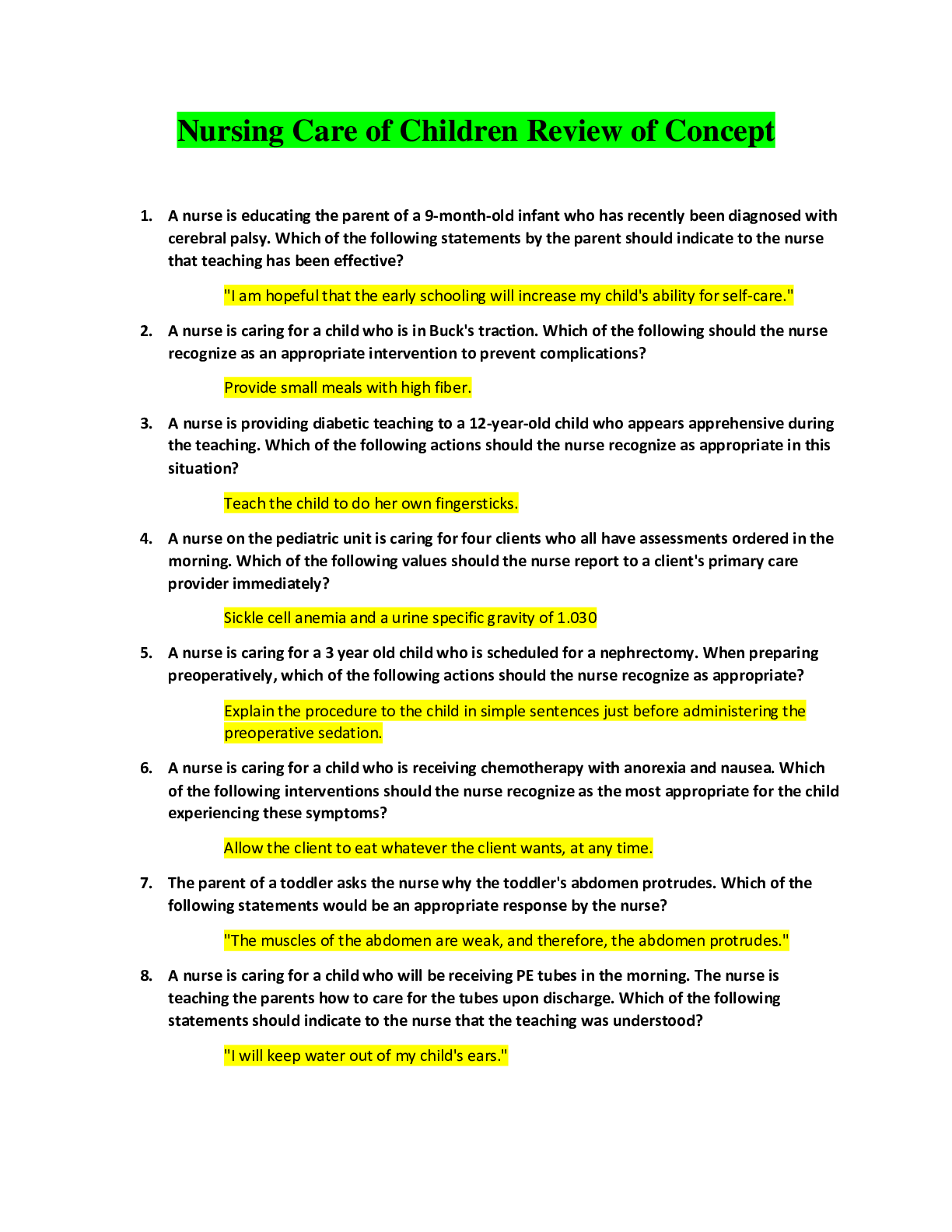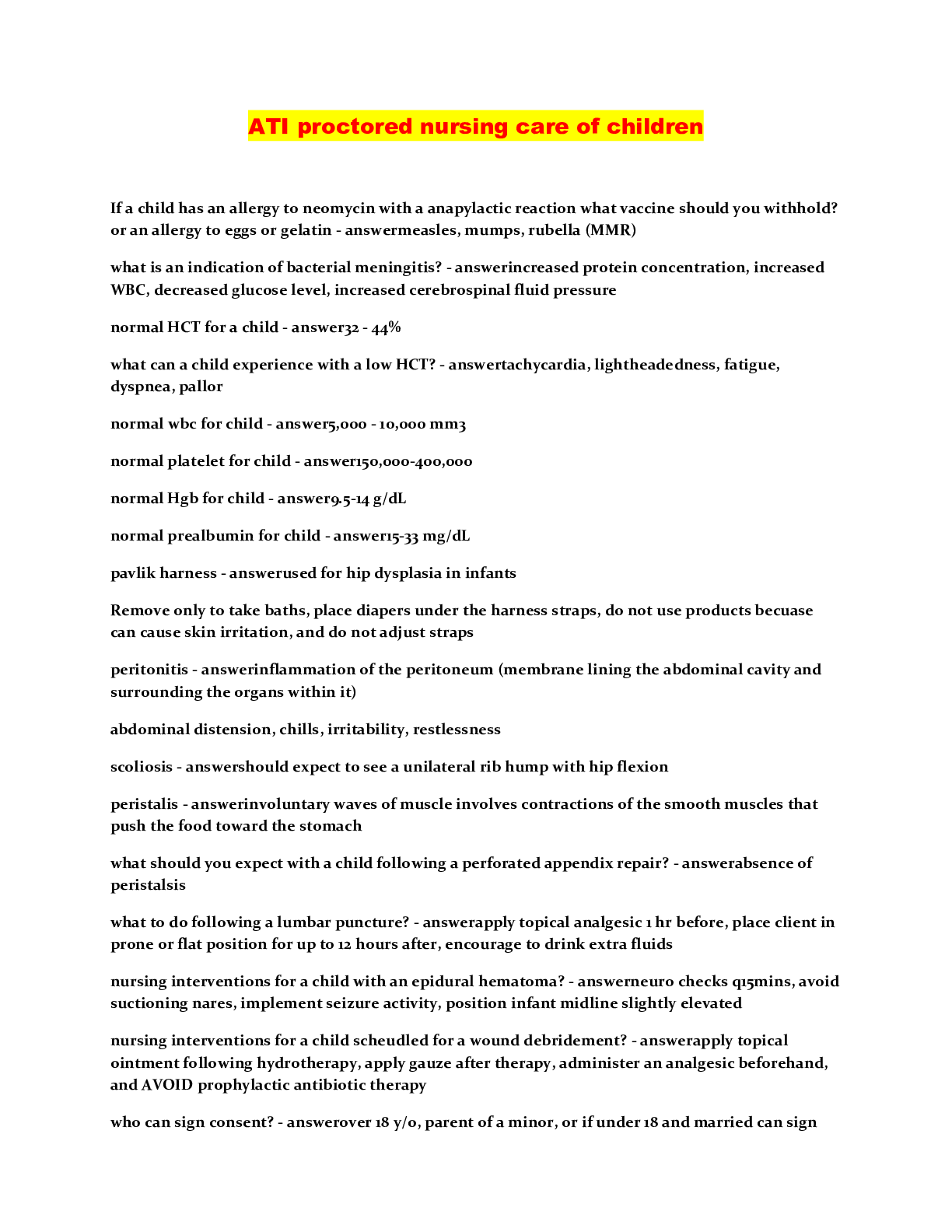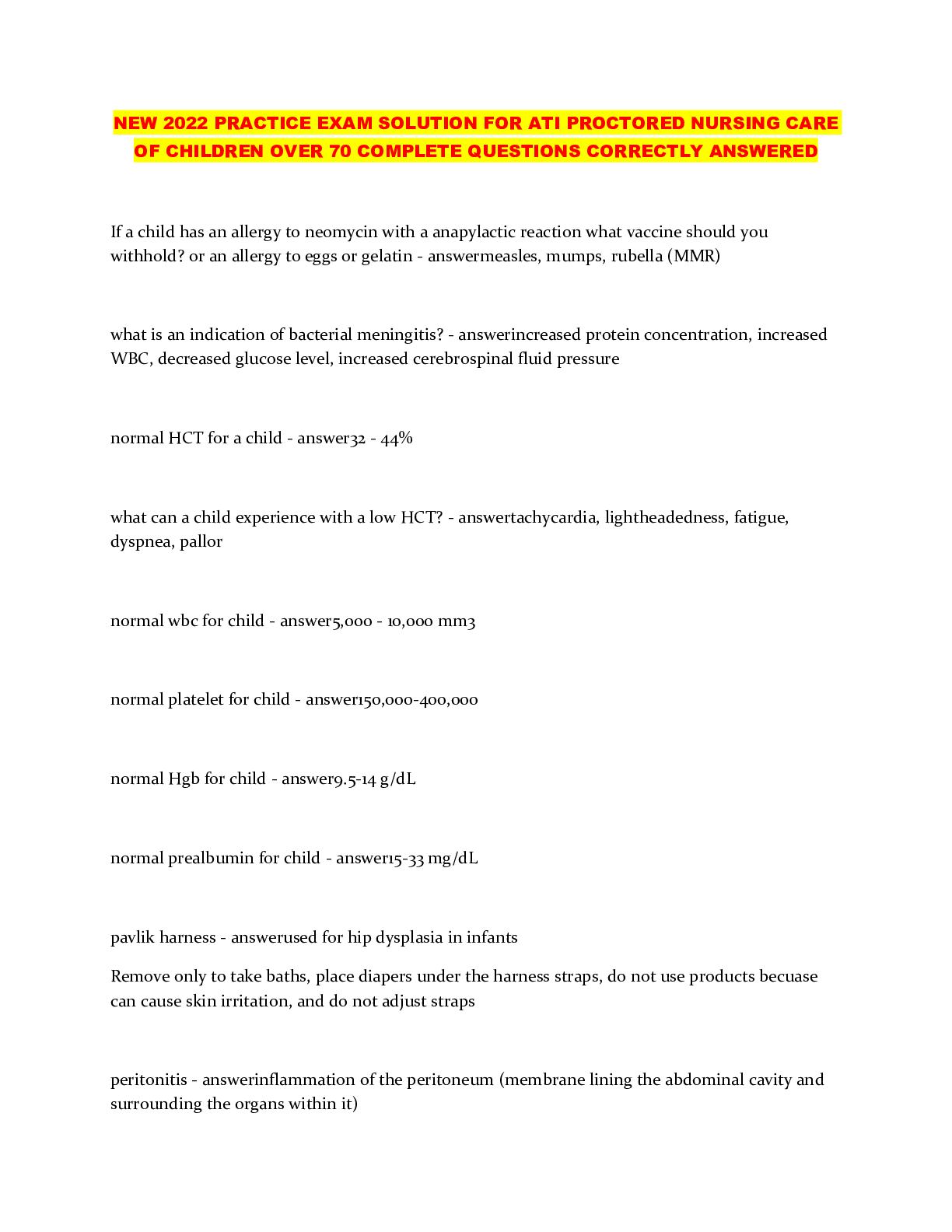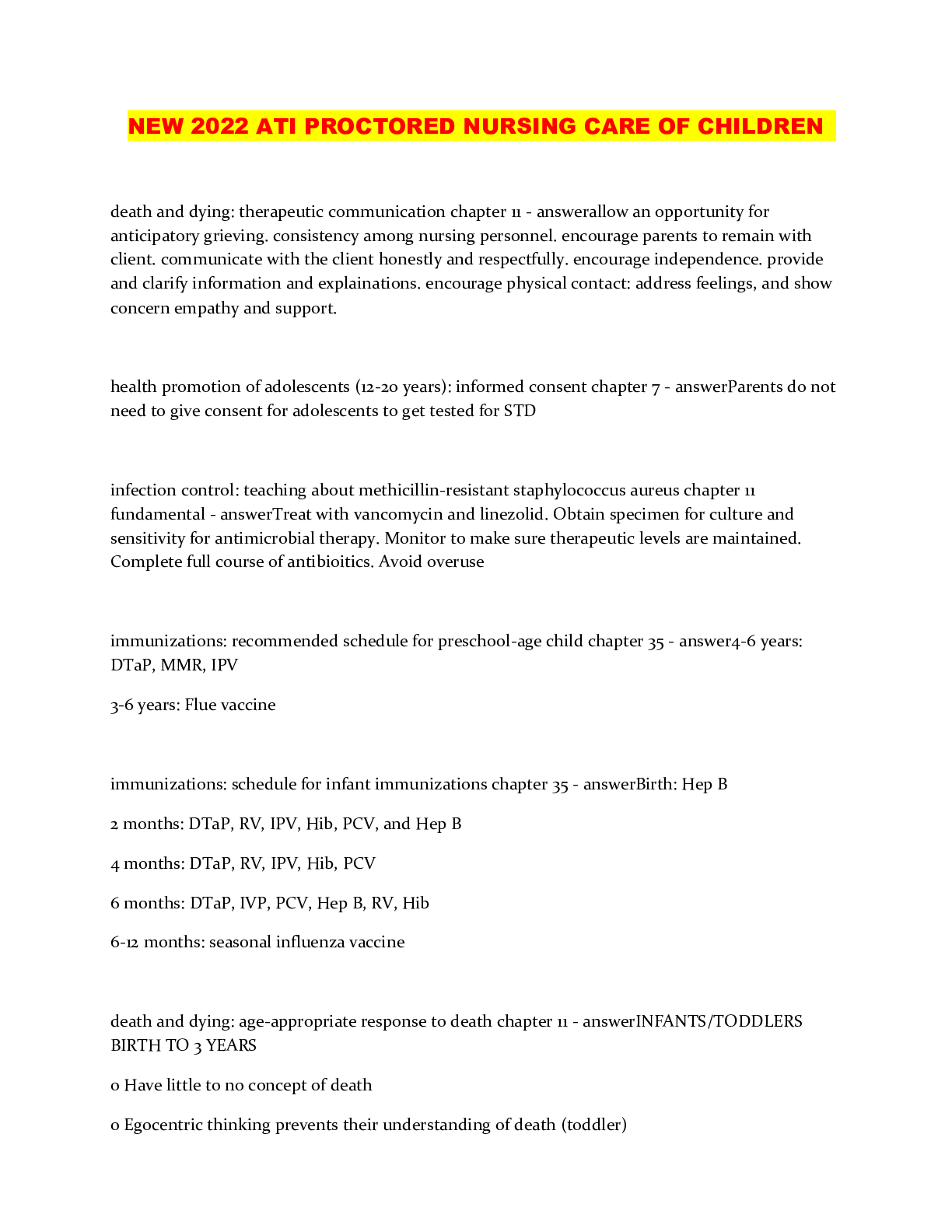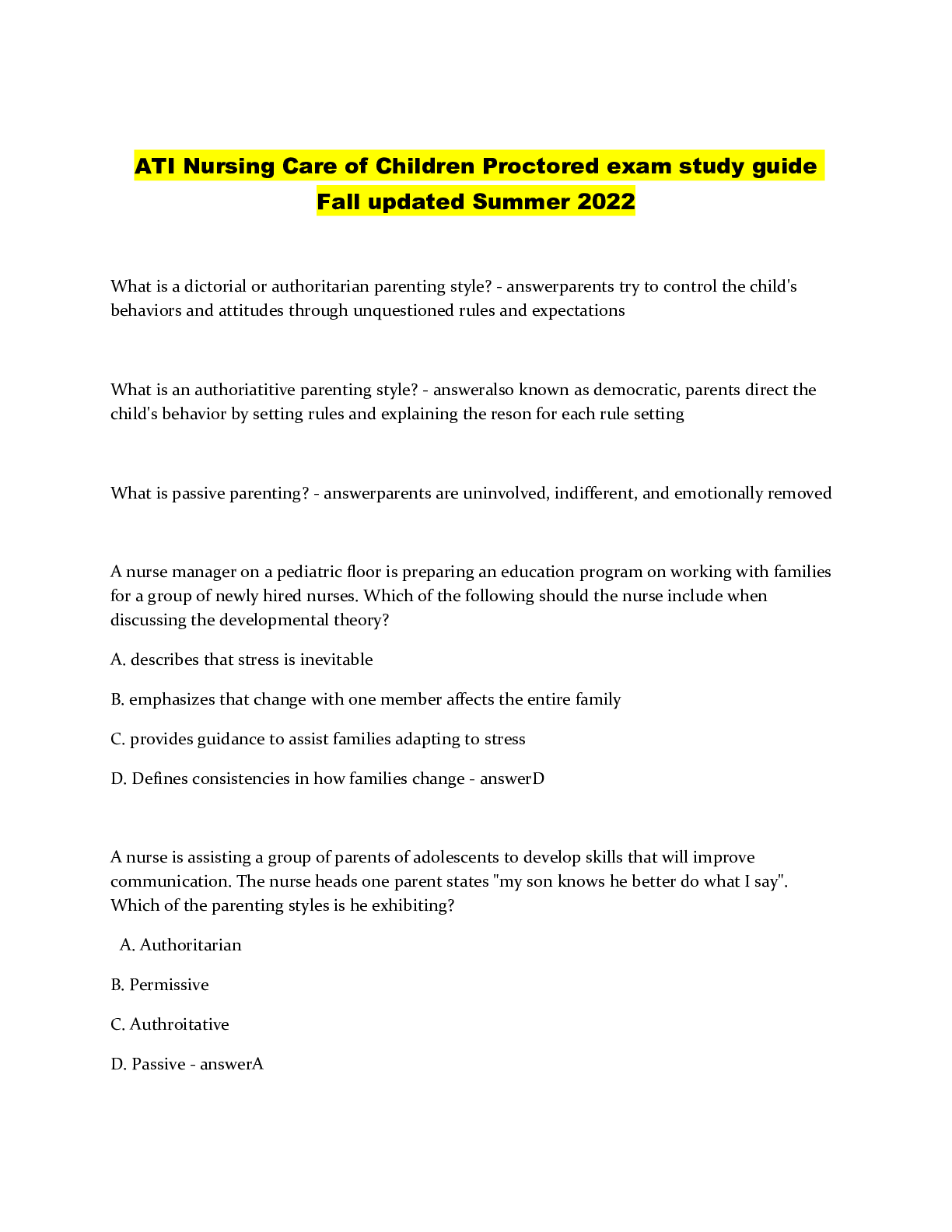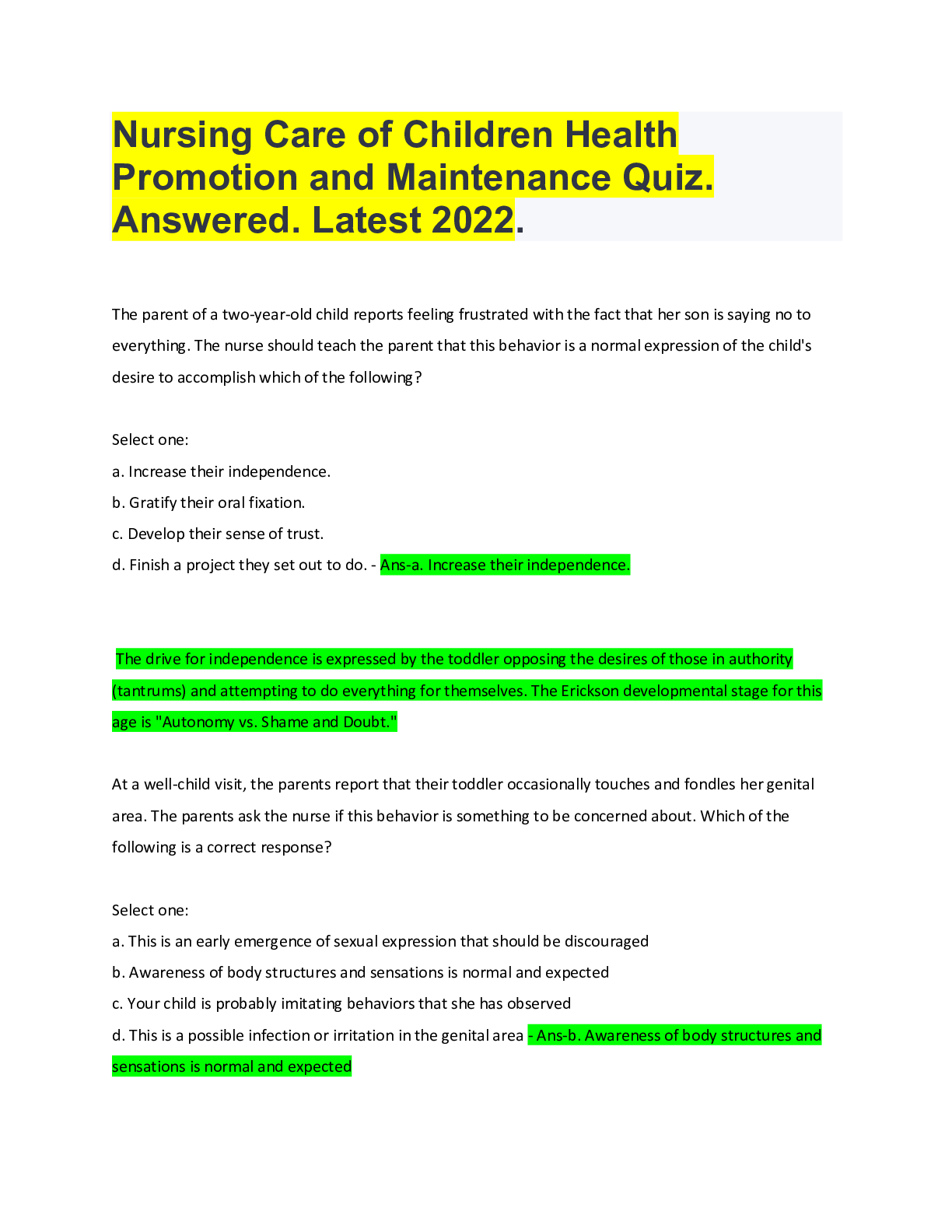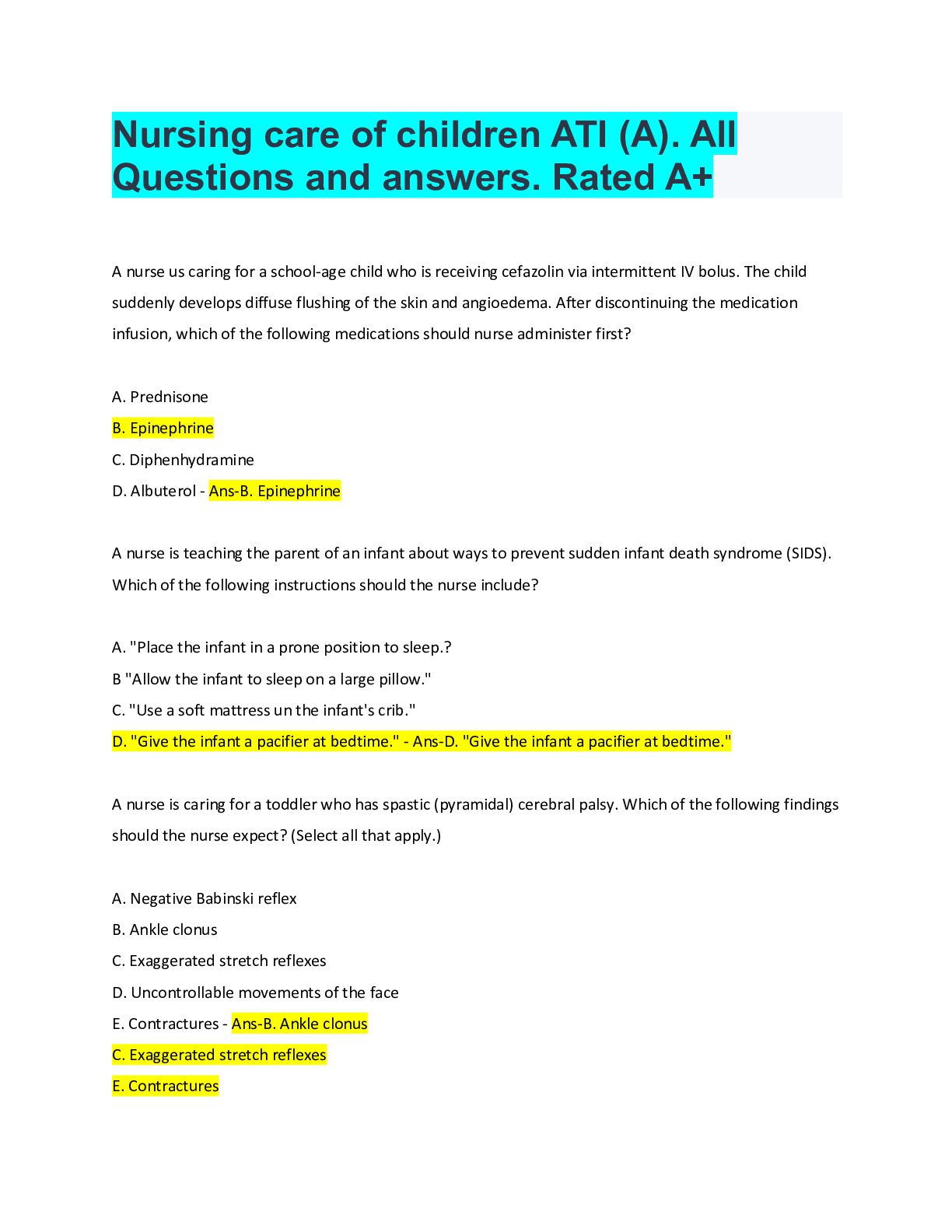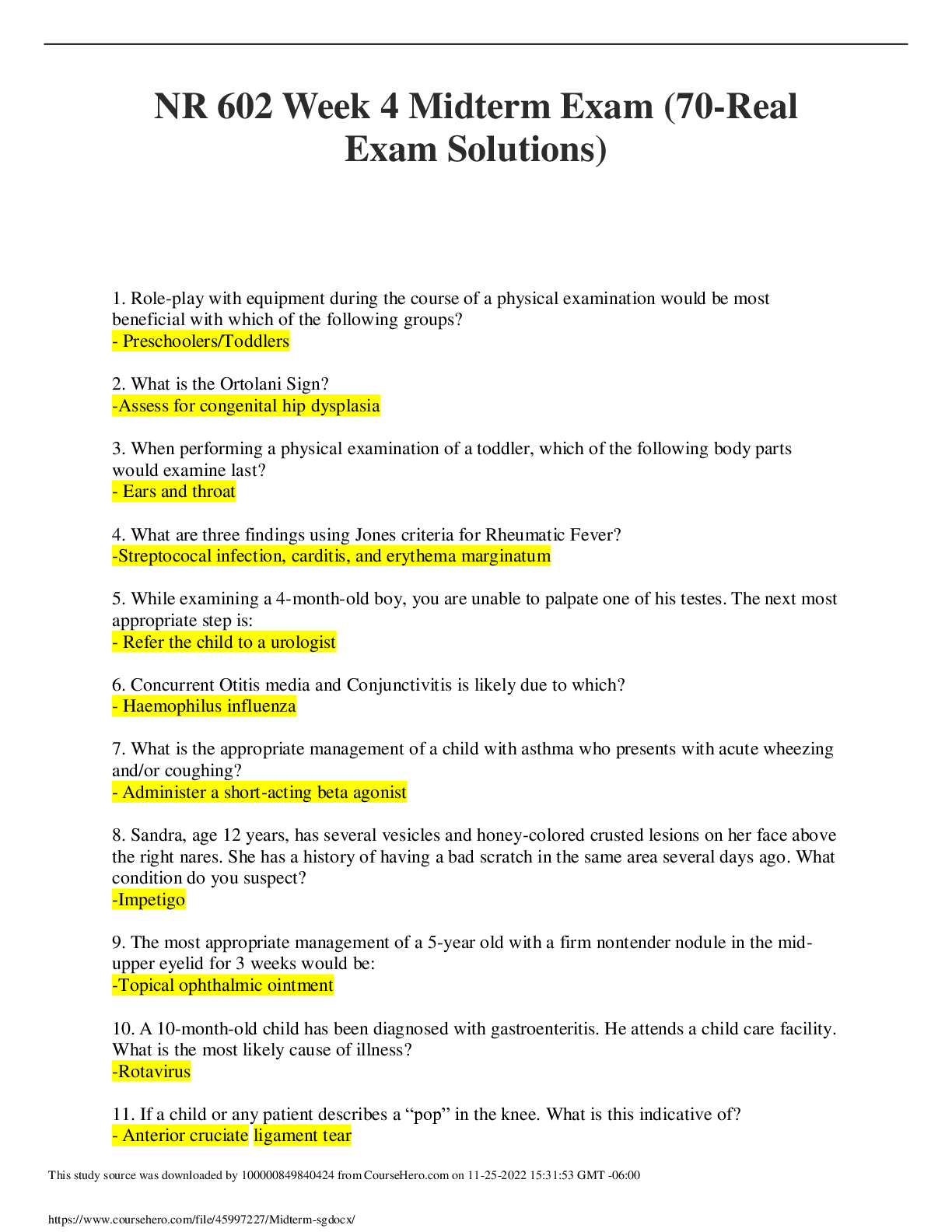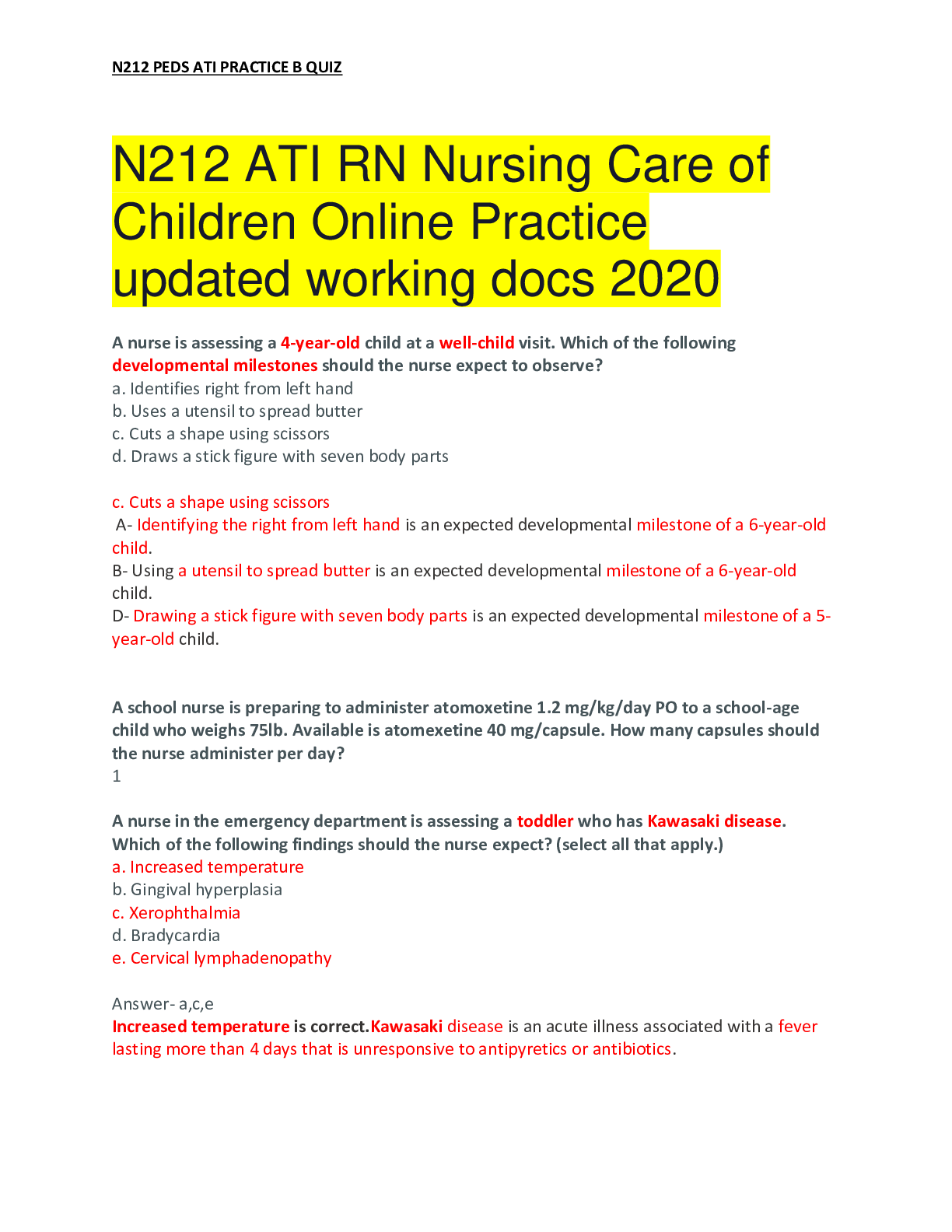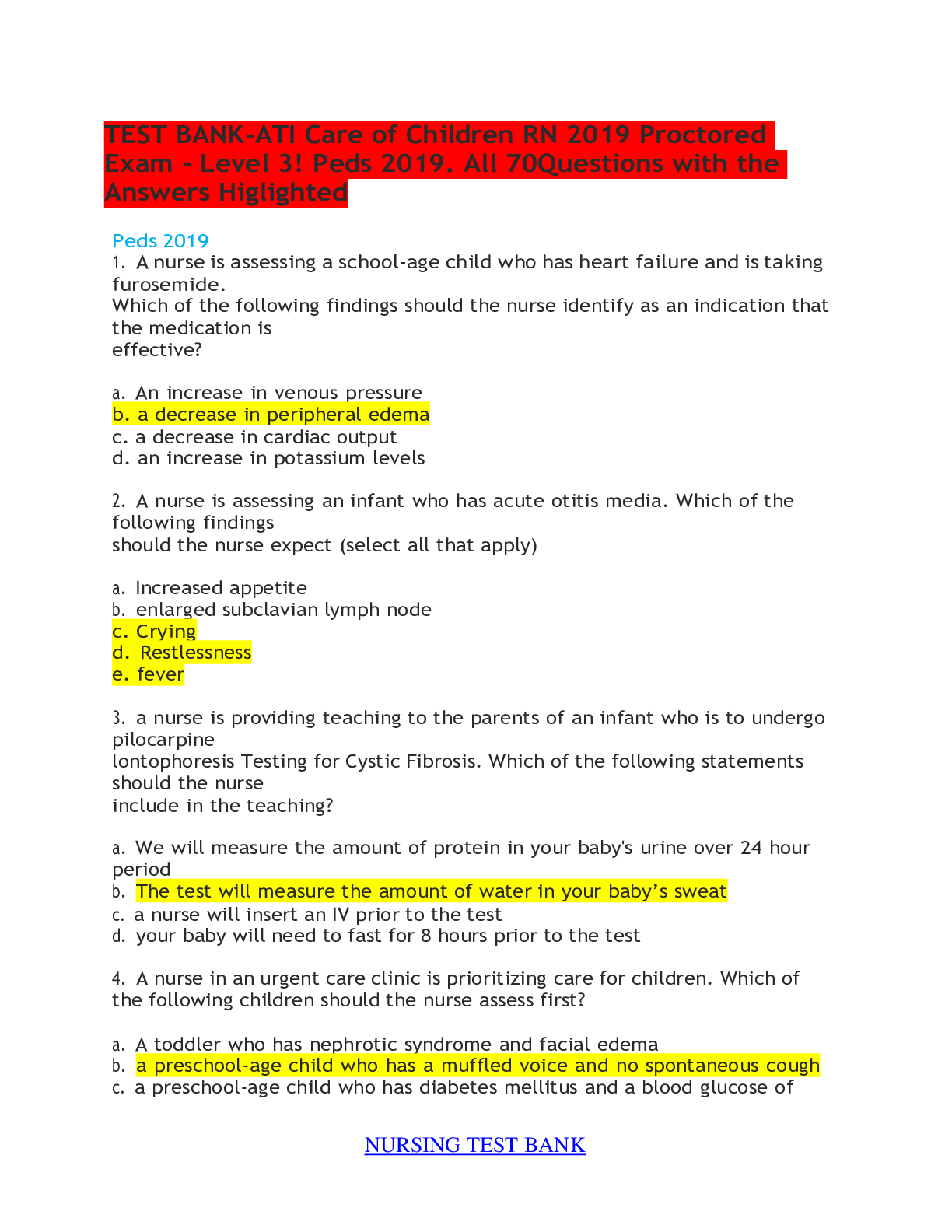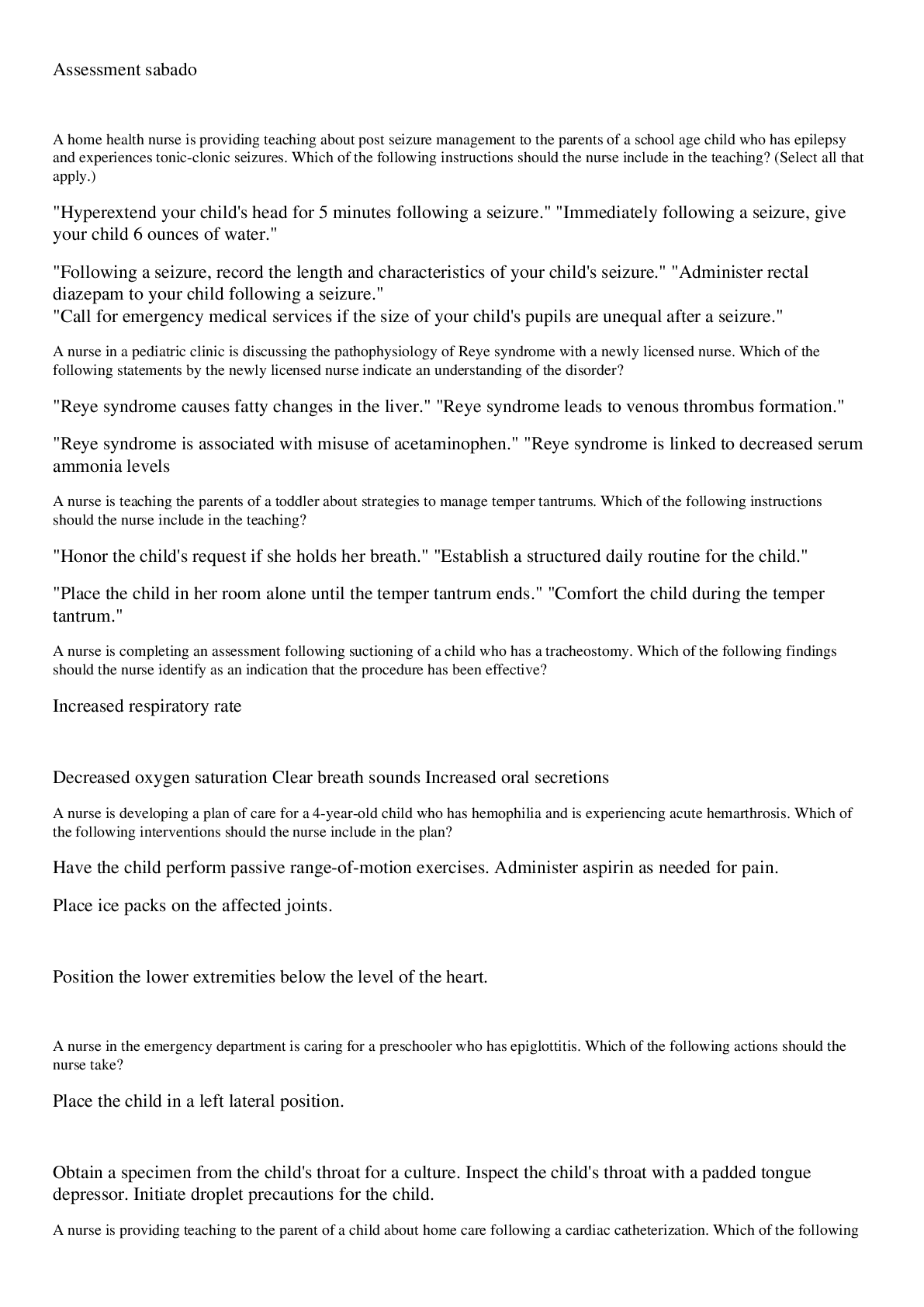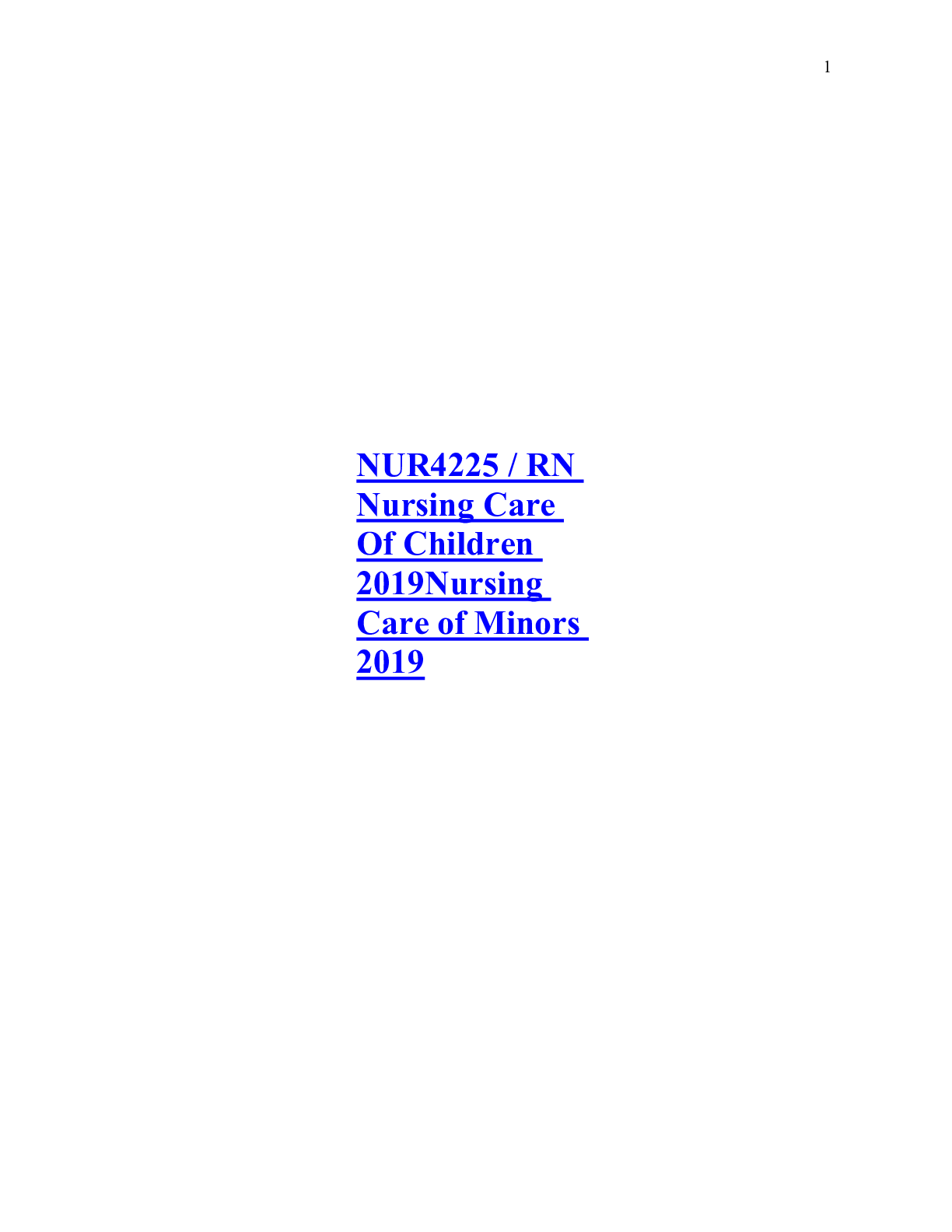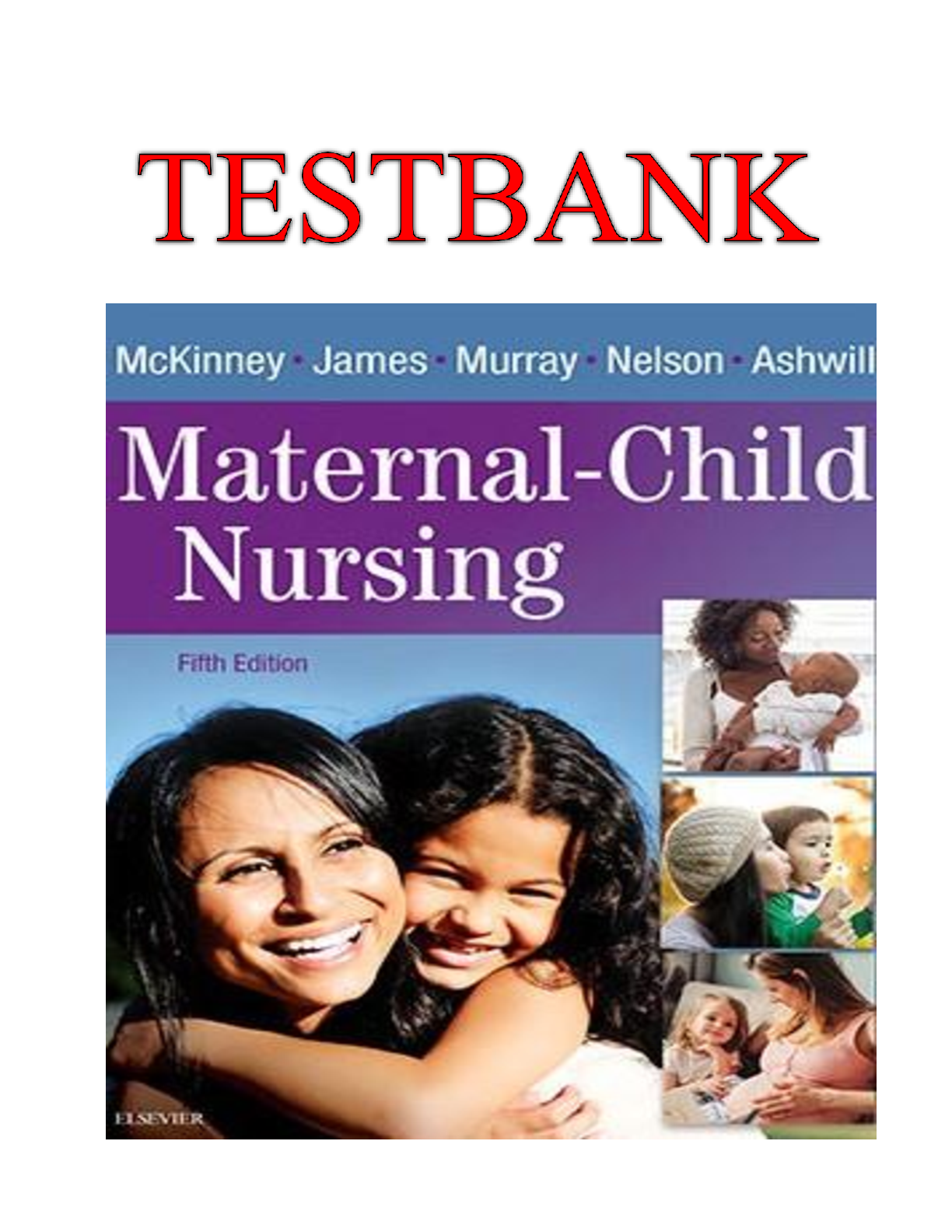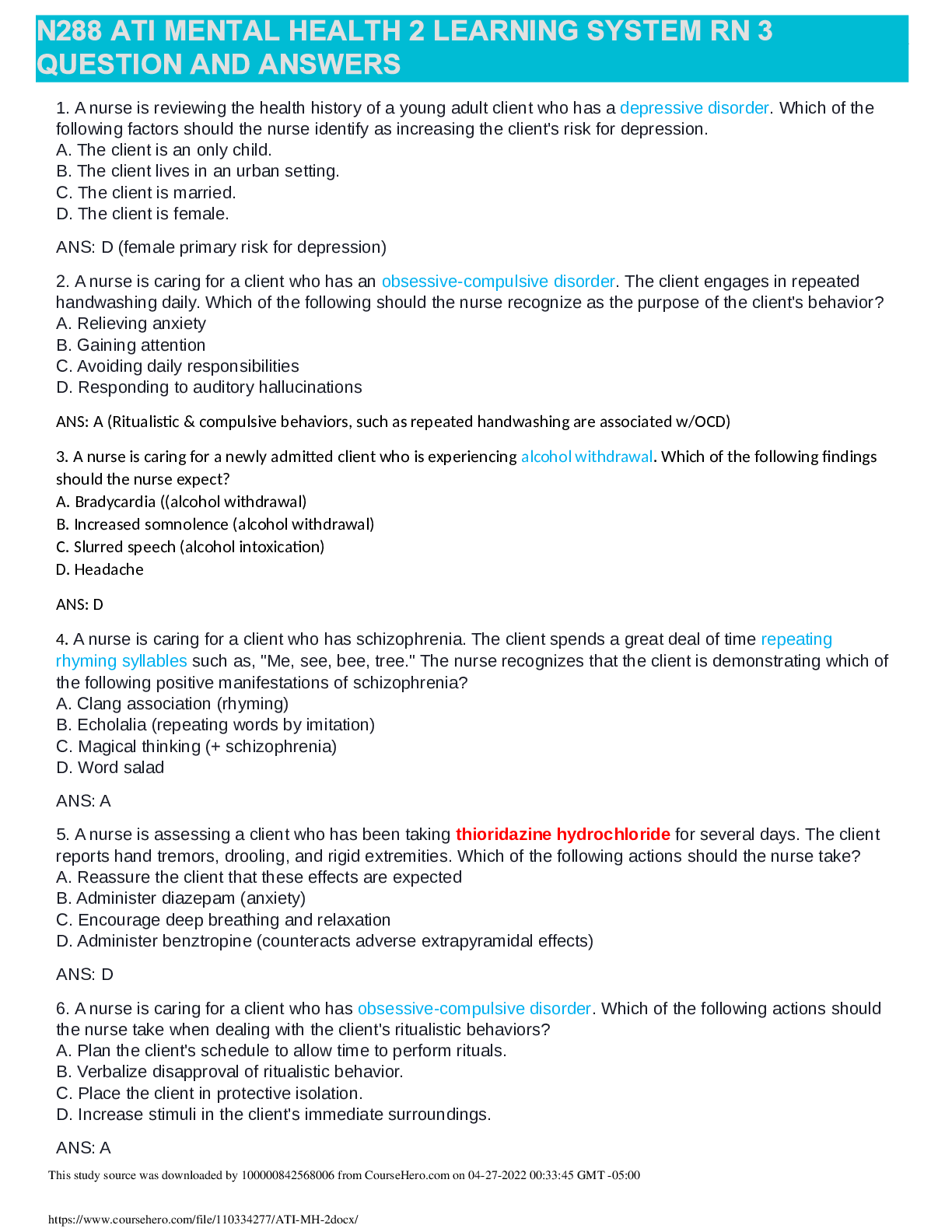*NURSING > QUESTIONS & ANSWERS > NR328 Pediatric Nursing - ATI Learning System RN 3.0 Quiz (Nursing Care of Children 1) : CHAMBERLAIN (All)
NR328 Pediatric Nursing - ATI Learning System RN 3.0 Quiz (Nursing Care of Children 1) : CHAMBERLAIN (ALL CORRECT ANSWERS)
Document Content and Description Below
1. A nurse in the emergency department is caring for a 2-year-old child who was found by his parents crying and holding a container of toilet bowl cleaner. The child's lips are edematous and inflamed,... and he is drooling. Which of the following is the priority action by the nurse? 2. A nurse is teaching a parent of a 12-month old child about development during the toddleryears. Which of the following statements should the nurse include? 3. A nurse is caring for a toddler and is preparing to administer 0.9% sodium chloride 100 mL IV to infuse over 4 hr. The drop factor of the manual IV tubing is 60 gtt/mL. The nurse should set the manual IV infusion to deliver how many gtt/min? (Round the answer to the nearest whole number. Use a leading zero if it applies. Do not use a trailing zero.) 4. A nurse in a pediatric clinic is assessing a toddler at a well-child visit. Which of the following actions should the nurse take? 5. A nurse is caring for an 18-year-old adolescent who is up-to-date on immunizations and is planning to attend college. The nurse should inform the client that he should receive which of the following immunizations prior to moving into a campus dormitory? 6. A nurse is teaching the parent of an infant about food allergens. Which of the following foods should the nurse include as being the most common food allergy in children? 7. A nurse is teaching the parent of a toddler about home safety. Which of the following statements by the parent indicates an understanding of the teaching? 8. A nurse is performing a physical assessment on a 6-month-old infant. Which of the following reflexes should the nurse expect to find? 9. A nurse is preparing to administer recommended immunizations to a 2-month-old infant. Which of the following immunizations should the nurse plan to administer? 10. A nurse is developing a plan of care for a school-age child who underwent a surgical procedure that resulted in temporary loss of vision. Which of the following interventions should the nurse include in the plan of care? 11. A nurse is assessing a 3-year-old child who is 1 day postoperative following a tonsillectomy. Which of the following methods should the nurse use to determine if the child is experiencing pain? 12. A nurse is assessing a 6-month-old infant at a well-child visit. Which of the following findings indicates the need for further assessment? 13. A nurse is observing a mother who is playing peek-a-boo with her 8-month-old child. The mother asks if this game has any developmental significance. The nurse should inform the mother that peek-a-boo helps develop which of the following concepts in the child? 14. A nurse is caring for a 15-month-old toddler who requires droplet precautions. Which of the following actions should the nurse take? 15. A nurse at a pediatric clinic is assessing a 5-month-old infant during a well-child visit. Which of the following findings should the nurse report to the provider? 16. A nurse is planning to collect a specimen from a male infant using a urine collection bag. Which of the following actions should the nurse take? 17. A nurse in a pediatric clinic is caring for a 3-year-old child who has a blood lead level of 3 mcg/dL. When teaching the toddler's parents about the correlation of nutrition with lead poisoning, which of the following information is appropriate for the nurse to include in the teaching? 18. A nurse is planning care for a 10-month-old infant who has suspected failure to thrive (FTT). Which of the following interventions should the nurse include in the plan of care? (Select all that apply.) 19. A nurse is assessing a 7-year-old child's psychosocial development. Which of the following findings should the nurse recognize as requiring further evaluation? 20. A nurse is providing education to the parent of a toddler who is about to receive her first dose of the MMR (measles, mumps and rubella) immunization. Which of the following statements by the parent indicates an understanding of the teaching? 21. A nurse is providing teaching to the parents of a 4-year-old child about fine motor development. Which of the following tasks should the nurse include in the teaching as an expected finding for this age group? 22. A nurse is providing teaching to the parents of a 4-year-old child about fine motor development. Which of the following tasks should the nurse include in the teaching as an expected finding for this age group? 23. A nurse in an emergency department is caring for an 8-year old who is up-to-date with current immunization recommendations and has a deep puncture injury. Which of the following should the nurse anticipate administering? 24. A nurse is providing teaching about promoting sleep with the parent of a 3-year-old toddler. Which of the following information should the nurse include? 25. A nurse is planning to implement relaxation strategies with a young child prior to a painful procedure. Which of the following actions should the nurse take? 26. A nurse is assessing a 6-year-old child at a well-child visit. Which of the following findings requires further assessment by the nurse? 27. A nurse is caring for a preschool-age child who is dying. Which of the following findings is an age-appropriate reaction to death by the child? (Select all that apply.) 28. A nurse is teaching the parent of an infant about home safety. Which of the following information should the nurse include? 29. A nurse is caring for an adolescent who is receiving pain medication via a PCA pump. When the nurse assess the client's pain at 0800, the client describes the pain as a 3 on a scale of 1 to 10. At 100, the client describes the pain as a 5. The nurse discovers the client has not pushed the button to deliver medication in the past 2 hr. Which of the following actions should the nurse take? 30. A nurse is assessing a 12-month-old male infant's vital signs during a well-child visit. The infant is in the 90th percentile of height. Which of the following findings should the nurse report to the provider? 31. A nurse is teaching the parent of a 12-month-old infant about nutrition. Which of the following statements by the parent indicates a need for further teaching? 32. A nurse is assisting a provider during a femoral venipuncture on a toddler. The nurse should place the child in which of the following positions? 33. A nurse is assessing a 9-month-old infant during a well-child visit. Which of the following findings indicates that the infant has a developmental delay? 34. A nurse is preparing to administer a liquid medication to an infant. Which of the following actions should the nurse take? 35. A nurse on a pediatric unit is reviewing the health record of a client who is demonstrating increasing levels of stress after admission. The nurse should identify which of the following findings as a risk factor for a stress-related reaction to hospitalization? 36. A nurse in the emergency department is caring for a 12-year-old child who has ingested bleach. Which of the following statements by the nurse indicated an understanding of this ingestion? 37. A nurse is caring for a child who has a bacterial endocarditis. The child is scheduled to receive moderate term antibiotic therapy and requires a peripherally inserted central catheter (PICC). Which of the following statements should the nurse include when teaching the child's parent? 38. A nurse is providing anticipatory guidance about accidental ingestion of a toxic substance to the parents of a toddler. The nurse should instruct the parents to take which of the following actions first if the child ingests a hazardous substance? 39. A nurse is caring for a 2-year-old child who has cystic fibrosis. The nurse is planning to take the child to the playroom. Which of the following activities would be appropriate for the child? 40. A nurse is assessing a 30-month-old toddler during a well-child visit. Which of the following findings requires further assessment by the nurse? [Show More]
Last updated: 1 year ago
Preview 1 out of 18 pages
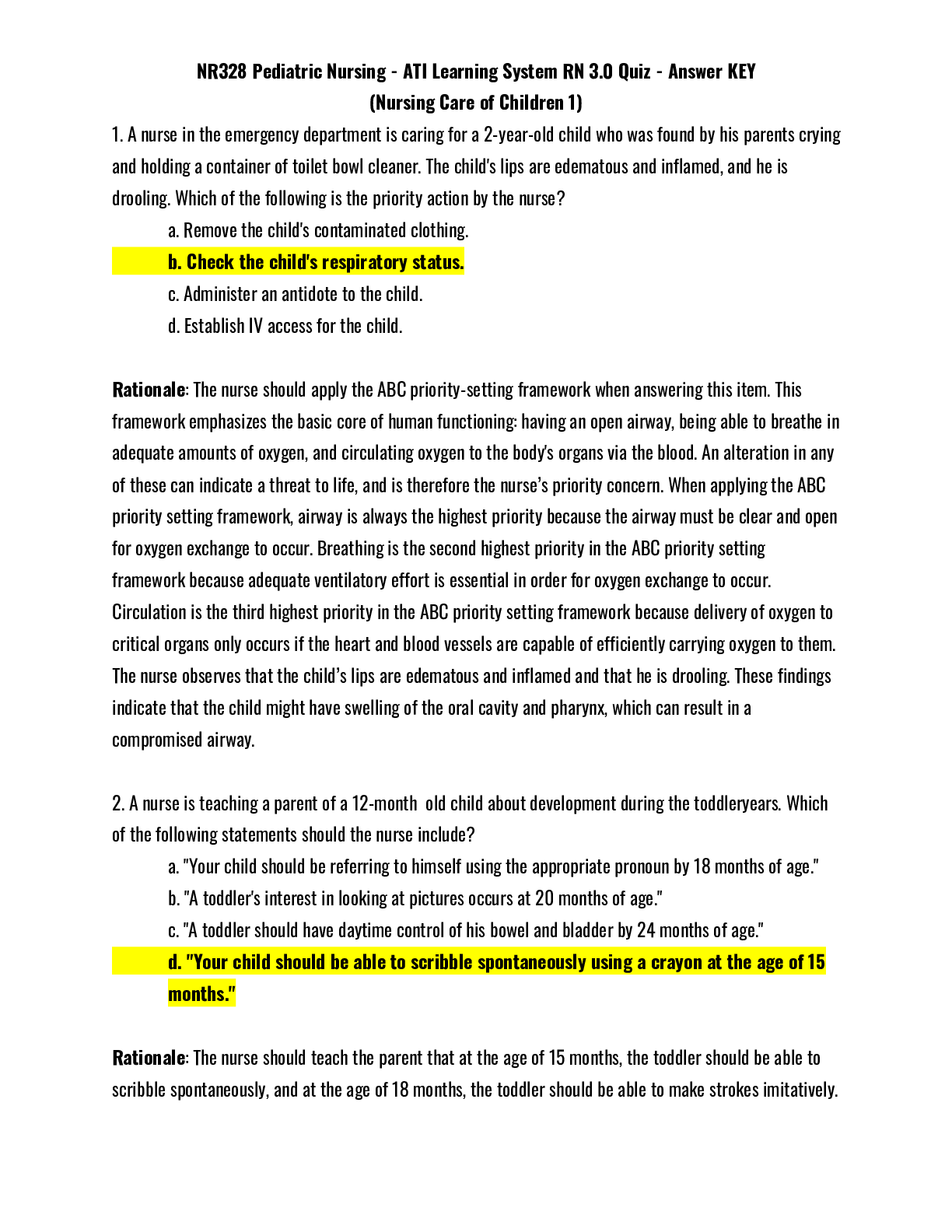
Reviews( 0 )
Document information
Connected school, study & course
About the document
Uploaded On
Apr 26, 2020
Number of pages
18
Written in
Additional information
This document has been written for:
Uploaded
Apr 26, 2020
Downloads
0
Views
80

